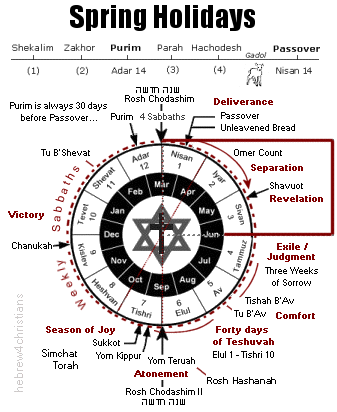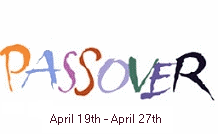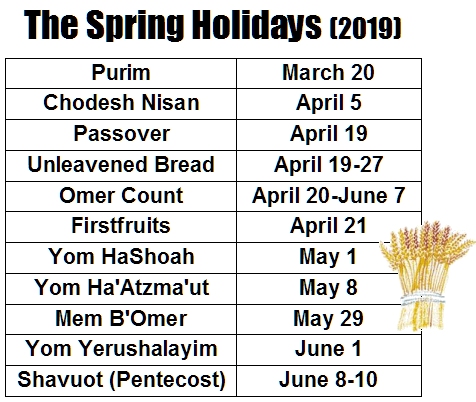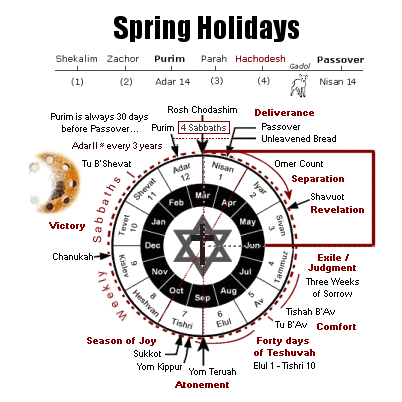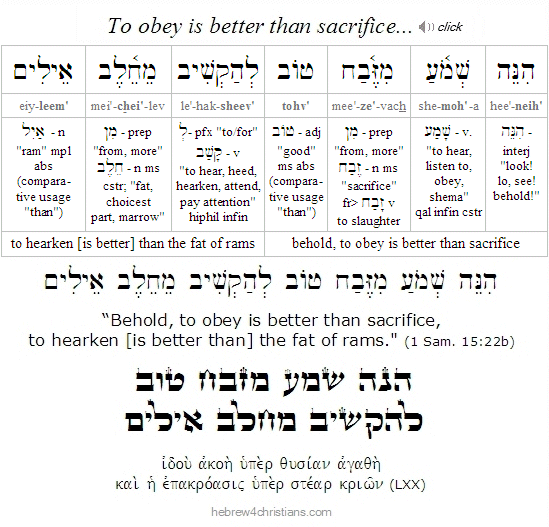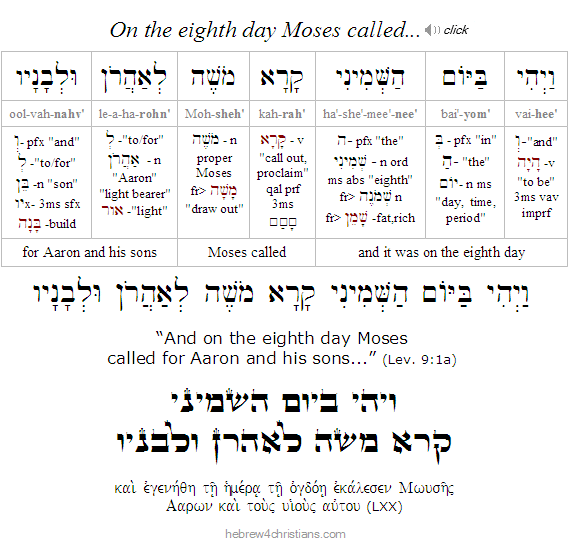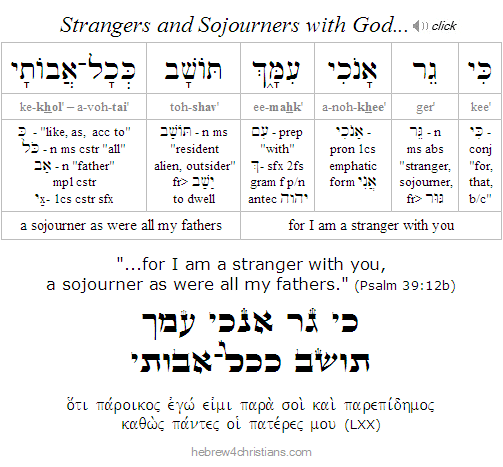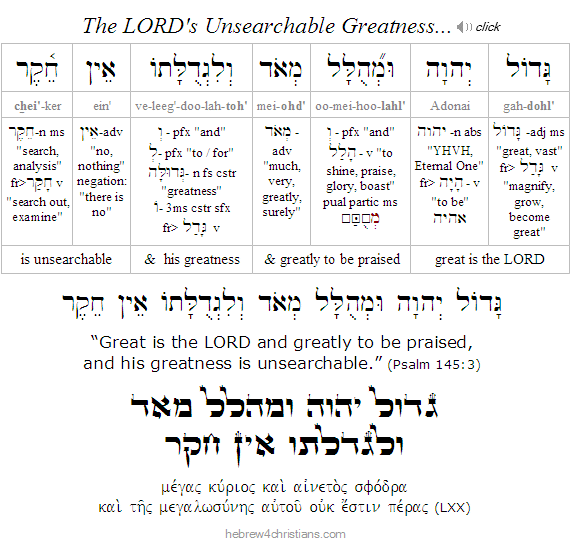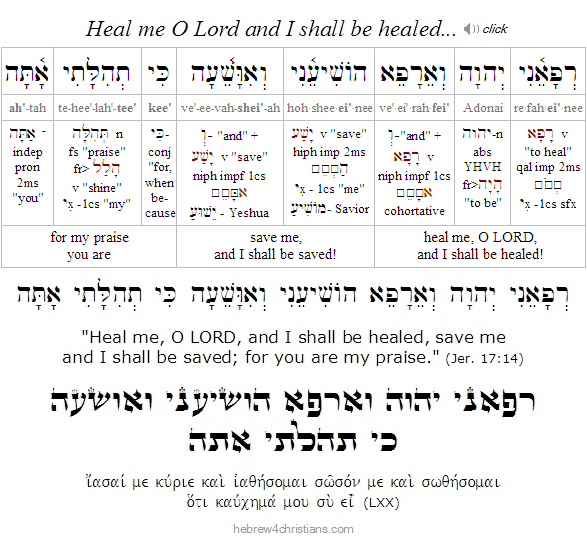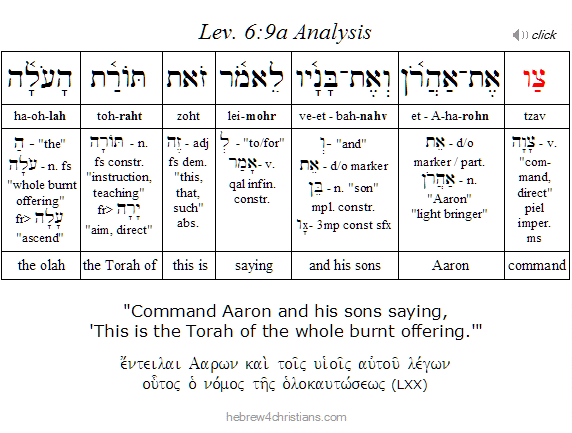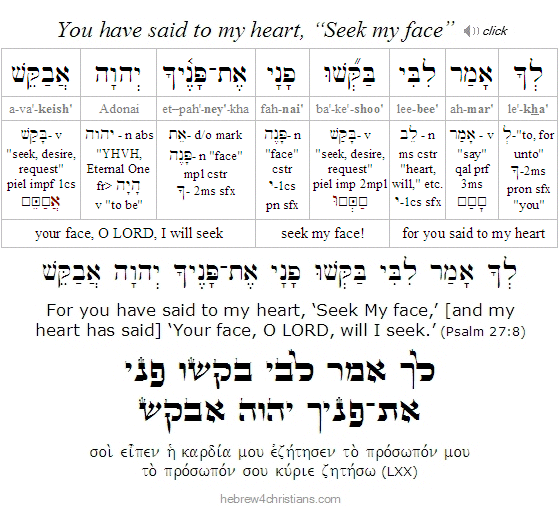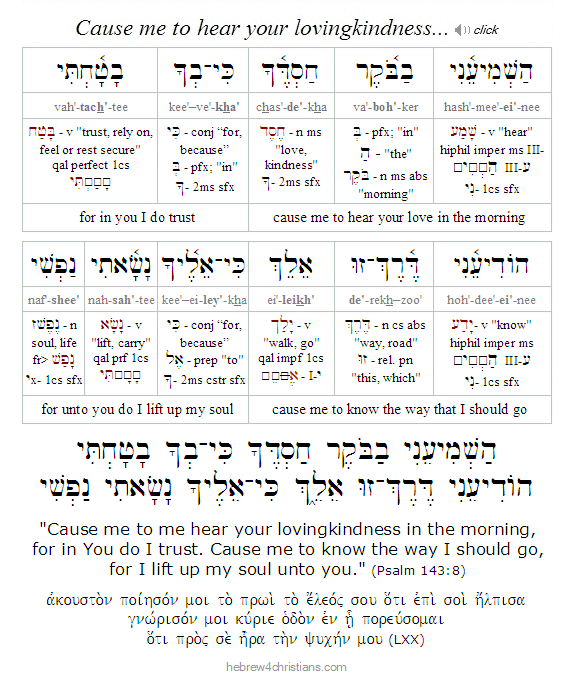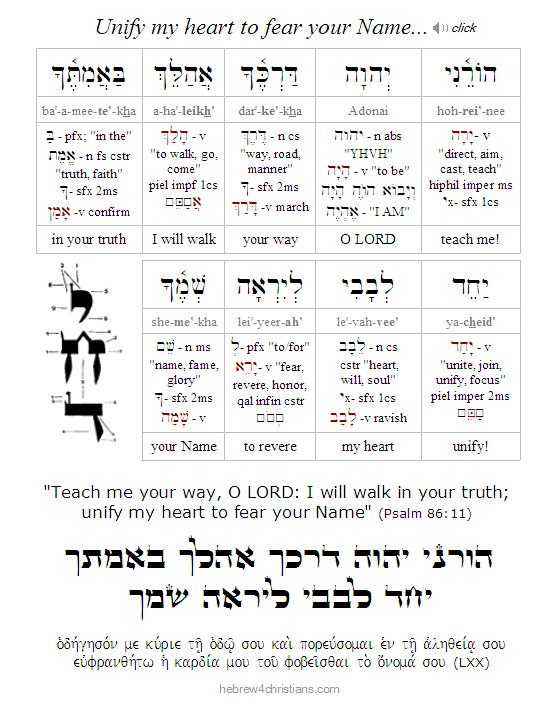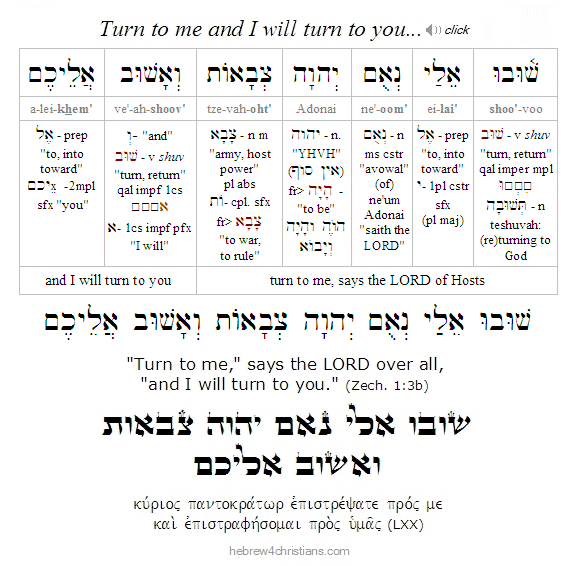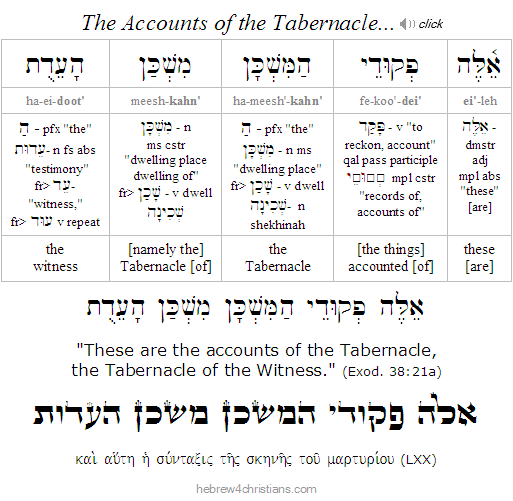|
Jewish Holiday Calendar
For March 2019 site updates, please scroll past this entry....
Spring is the start of the Biblical Year and is marked by two of the Shelosh Regalim (three annual pilgrimage festivals): Pesach (Passover) and Shavuot (Pentecost). The holiday of Shavuot is held seven weeks (or fifty days) following the morning after Pesach.
Dates for Passover 2019:
The Spring Holidays:
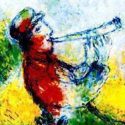
The spring holidays provide a portrait of the death, burial, and resurrection of the Messiah: Yeshua was crucified on erev Pesach, buried during Chag Hamotzi, and was resurrected on Yom Habikkurim (Firstfruits). Shavuot (i.e., the feast of Pentecost) was the day the Ruach HaKodesh (Holy Spirit) fell on believers in fulfillment of the promise given by our Lord.
Note that in accordance with tradition, the following holiday dates begin at sundown:
- Month of Adar II (Wed. March 6th [eve] - Fri. April 5th [day])
- Month of Nisan (Fri. April 5th [eve] - Sat. May 4th [day])
- Month of Iyyar (Sat. May 4th [eve] - Mon. June 3rd [day])
- Month of Sivan (Mon. June 3rd [eve] - Tues. July 2nd [day])
Note: Because this is a Jewish leap year, the holiday of Passover -- and particularly the Festival of Firstfruits -- will not occur near the traditional date of "Easter" or "Resurrection Sunday" as it is often called in the Gregorian calendar... For more information, see the Calendar Pages....
March 2019 Updates
The Biblical New Year (ראשׁ חֳדָשִׁים)
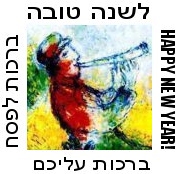
[ The Biblical New Year begins Friday, April 5th at sundown this year... ]
03.31.19 (II Adar 24, 5779) Did you know that the Biblical Year begins on Nisan 1st of the Torah's calendar? Indeed, the LORD set apart this day as the "beginning of the months" of the calendar (called Rosh Chodashim), which begins the calendar year itself (Exod. 12:1-2). This may seem a bit odd to you, though remember that the world runs on a "clock" that operates under assumptions that are different than those revealed in the Scriptures.... The "wisdom of this world" (σοφία τοῦ κόσμου τούτου) is the prevailing cultural spirit that suppresses the reality of God's Presence and truth. Such "wisdom" is regarded as foolishness before God, and God has promised to "seize the so-called wise in their own craftiness" (1 Cor. 3:19). The life of faith, on the other hand, sees what is invisible. Faith apprehends "the substance (ὑπόστασις) of things hoped for, the assurance (ἔλεγχος, conviction, "correction," i.e., tokhachat: תוֹכַחַת) of things not seen" (Heb 11:1). As the Scripture says, the heart of faith "looks not to the things that are seen but to the things that are unseen. For the things that are seen are transient, but the things that are unseen are eternal" (2 Cor. 4:18).
The Sabbath that immediately precedes (and sometimes falls on) the Biblical New Year is called Shabbat HaChodesh (שַׁבַּת הַקּדֶשׁ), the "Sabbath of the Month" (of Nisan). This Sabbath is significant because it commemorates the start of the month of Redemption (i.e., the first month called Nisan) which God called "the beginning of months." We remember this special event by reading an additional passage from the Torah (i.e., maftir) concerning the sanctification of the new moon (Exod. 12:1-20), and we spiritually prepare for this month by studying about Passover and the coming spring holidays:
 |
The commandment to sanctify the first new moon of the year (i.e., Rosh Chodashim) reveals that it is our responsibility to sanctify (i.e., observe) Biblical time in general. In other words, when we observe "the beginning of months," we are acknowledging that time itself is rooted in the Biblical calendar with its divinely inspired cycle of festivals (i.e., the moedim). Note that this year the Biblical New Year begins on Friday April 5th at sundown (i.e., Shabbat), and therefore Passover begins exactly two week weeks later, Friday, April 19th at sundown.
Note: For more about the Torah's New Year, see the "Rosh Chodashim" pages...
Parashat Tazria - תזריע

03.31.19 (II Adar 24, 5779) Our Torah portion for this week (i.e., parashat Tazria) concerns cleansing from "uncleanness" (טָמֵא), as symbolized by the healing and purification of the metzora (i.e., "leper") in a ritual similar to that performed during the Day of Atonement. The sages note that the spiritual disease of tzara'at was a sign from God that the Israelites were indeed a chosen nation, since the affliction moved them to do teshuvah to be in fellowship with Him. Likewise God sometimes disciplines us for our sins (Heb 12:7-8) for the purpose of granting us the gift of teshuvah (2 Cor. 7:10). We must therefore strive to make our conversation and the inmost intent of our hearts "captive to the obedience of the Messiah," blessed be He (Matt. 5:37; Eph. 4:29; Col. 3:8; 2 Cor. 10:5; 1 Tim 4:2; etc.).
A student once asked his rebbe: "Do we get punished for our sins in this world?" His succinct response was, "Only if we are fortunate..." Indeed, correction from God is a blessing in disguise, since there is no worse state in this life than to be untouched or overlooked by God (Rom. 1:28). God is teaching us through our failures; he is training us to persevere, to endure, and to become strong. As it is written, "If you are left without discipline (מוּסָר), then you are illegitimate children and not sons" (Heb. 12:8).
The early sages said that tza'arat comes from lashon hara (i.e., gossip or the abuse of our words). Indeed Yeshua clearly warned us, "I tell you, on the Day of Judgment people will give account (ἀποδίδωμι) for every careless word they speak (i.e., πᾶν ῥῆμα ἀργόν, all "empty" or "thoughtless" words), for by your words you will be justified, and by your words you will be condemned" (Matt. 12:36-37). Every word we utter reaches up to the highest places of heaven and echoes there. The sages warn that the Holy One, blessed be He, sends an angel who records every word you say about your neighbor in the "heavenly scrolls" (Rev. 20:12). Therefore King David admonishes, "Who desires life and loves many days that bring forth good? Guard your tongue from evil and keep your lips from using deceptive speech. Turn away from evil and do good; seek peace and pursue it" (Psalm 34:13-14).
In the Gospels we read how Yeshua healed various "lepers" and even touched them (e.g., Matt. 8:2-3, Mark 1:40-41). But how could He do this without becoming tamei (unclean) himself? We must remember that it was the prerogative of the LORD God of Israel to "touch" those afflicted with tzara'at and heal them based on their teshuvah, and in like measure, Yeshua entered the "leper colony" of humanity to heal those who cried out to Him. He is the same yesterday, today, and forever, and His love reaches down to those who are afflicted and oppressed on account of their uncleanness. If you call upon Him, He will likewise touch you and restore you to fellowship with God.
Note: Tomorrow is our beloved son Judah's tenth birthday! Please offer up a prayer for this kindhearted boy to become a man of God who will serve the LORD our God. Thank you!
Draw Near to God...

[ The following is related to this week's Torah reading, parashat Shemini. Shabbat Shalom! ]
03.29.19 (II Adar 22, 5779) The sages ask, "Why does the Torah use a repetitious expression, "Sanctify yourselves and you shall be holy" (הִתְקַדִּשְׁתֶּם וִהְיִיתֶם קְדשִׁים) (Lev. 11:44)? Because when we make an effort - no matter how feeble at times - to draw near to God, He will draw near to us. As we sanctify ourselves, so God sanctifies us. Therefore "let us not grow weary of doing good, for in due season we will reap, if we do not give up." (Gal. 6:9). So focus and draw near to God, and you will find that he has drawn near to you (James 4:4; Heb. 11:6). Blessed are You LORD our God, who gives strength to the weary:
בָּרוּךְ אַתָּה יְהוָה אֱלהֵנוּ מֶלֶךְ הָעוֹלָם
הַנּוֹתֵן לַיָּעֵף כּהַ
ba·rukh at·tah Adonai E·lo·hei·nu me·lekh ha'o·lam
ha·no·tein lai·ya·ef ko·ach

"Blessed are You, LORD our God, King of the universe,
who gives strength to the weary."

Suffering and Hope...

[ The following entry may seem a bit dismal, but on the contrary, it bespeaks deep and abiding comfort... It is a message for those who need it in the midst of the fire, but to those who think the walk with God is without mortification, it will likely seem gloomy and sad... ]
03.29.19 (II Adar 22, 5779) In times of severe testing people often do not need further teaching, but rather "endurance," or what the New Testament calls hupomone (ὑπομονή), a word that means "remaining [μένω] under [ὑπο]" the Divine Presence while being tested. Suffering people do not need moral platitudes from others, but only the will to believe, the resolution to stay constant, and the faith to breathe out simple prayers for help to the LORD: "God have mercy..." "Help me, O God..." "I need Thee, O Lord..." When we receive grace to faithfully suffer, we hear the Spirit whispering back to us: "Be not afraid..." "Live in me..." "Walk in the light..." "I am with you always..." "You are loved..."
"Unto thee O Lord, do I lift up my soul" (Psalm 25:1). Before we can lift up our soul as an offering before the LORD in sacrifice, that is, yielding to his will, surrendering our desires, our hopes, yea, our very lives to him, we must first be broken and confess our heart's unwillingness to let go of its pain, its mistrust, and its cowardly evasion of suffering.
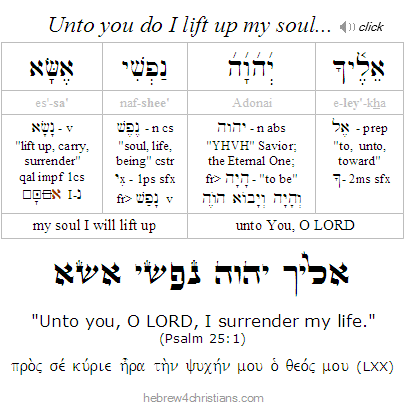 |
Reflecting on the role of suffering in the heart of faith, Dietrich Bonhoeffer wrote: "Here is the decisive difference between Christianity and all religions. Man's religiosity makes him look in his distress to the power of God in the world: God is the deus ex machina. The Bible directs man to God's powerlessness and suffering: only a suffering God can help" (Letters and Papers from Prison). Bonhoeffer's comment alludes to the difference between an "Elohim" (אֱלהִים) conception of God as the omnipotent power of reality, and the "YHVH" (יהוה) conception of God as the compassion Source and Breath of life - the Suffering God who empties himself, abandons his omnipotence to partake of our condition - to know our pain, to bear our sorrows, to heal us from the sickness of spiritual death, and to touch us in the loneliness of our exile... The Spirit of God enables us to "groan" in compassion, directing us away from the desire to "kill the pain" to accept it as part of our lament and need for connection with God.
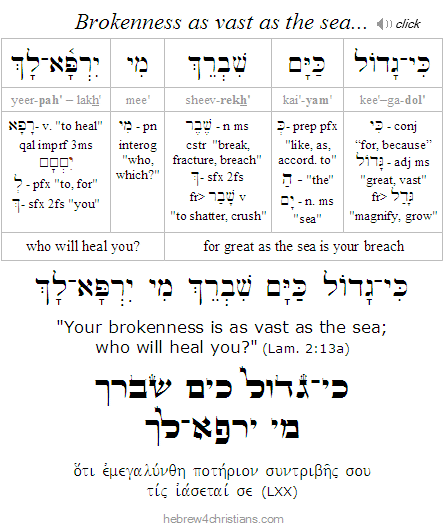 |
Unlike cognitive faith (אֱמוּנָה) that assents to theological conformities, trust (בִּטָחוֹן) emotionally commits to God's presence in the sorrows of our lives and retains hope that we are not finally alone, abandoned, helpless... Trust goes beyond the "idolatries of theology," that is, various theological conceptions of God as impassive, inexpressive, and distant in his decrees of transcendence, to engage God personally, existentially, and from within the whirlwind of harrowing pain and pain's great loneliness. Authentic theology is dialectical or "dialogical" -- a conversation of the heart with God - seeking, yearning, protesting, lamenting, and struggling with life's inscrutabilities and unfathomable questions as it appeals to God for the assurance of genuine hope. Trust finds courage to give voice to our sorrow and fears, inviting God into the midst of our brokenness, often yielding to tearful silence in unknowing expectation. As Dorothy Soelle wrote: "Prayer is an all-encompassing act by which people transcend the mute God of an apathetically endured reality and go over to the speaking God of a reality experience with feeling in pain and happiness" (Soelle: Suffering). This is perhaps the deepest meaning of the Shema - to listen for God's heart in the midst of your struggle; it is learning to encounter God's compassion in the place of your brokenness and need.
When I feel hopeless, I seek hope; when in pain, I seek comfort; when in despair over besetting sins, I yearn again for a place I can call home... In the midst of these things, my heart wonders whether my suffering has come because I deserve it or somehow "need" it. I reason that it may make sense that God extends special care for his godly ones, for those who are righteous and who seem free from the vexation of despair, but does it make sense for me, one who is undone, broken, alone, and unworthy? My heart protests that this is not the whole story of my life, and that more to be said. I need God and I know that he cares for me. I recall his promises to heal us, to bind up the broken of heart, and extend his comfort for our afflictions. Might pain herald the advent of something new to come? Might there be a deeper beauty and surpassing good as we go "through the wound" instead of objecting to it? Deep within I discover that I can bless the Lord, losing sight of myself as I affirm my deepest purpose and heritage: "My (boundary) lines have fallen to me in pleasant places; indeed, my inheritance is beautiful to me" (Psalm 16:6). Though I might have felt bereft and even tempted to curse my estate, by God's grace I am made able to give thanks and to bless, even in the midst of my troubles and pain: "I will bless the LORD who has counseled me; my conscience disciplines me in the night" (Psalm 16:7). Therefore שִׁוִּיתִי יְהוָה לְנֶגְדִּי תָמִיד - "I have set the Lord always before me" – especially in desperate moments when I can barely endure – since I have learned that "because he is at my right hand, I shall not come undone" (Psalm 16:8). God gives me strength to renew my hope: therefore "my heart is made glad, my whole being rejoices, and my body rests in trust" (Psalm 16:9).
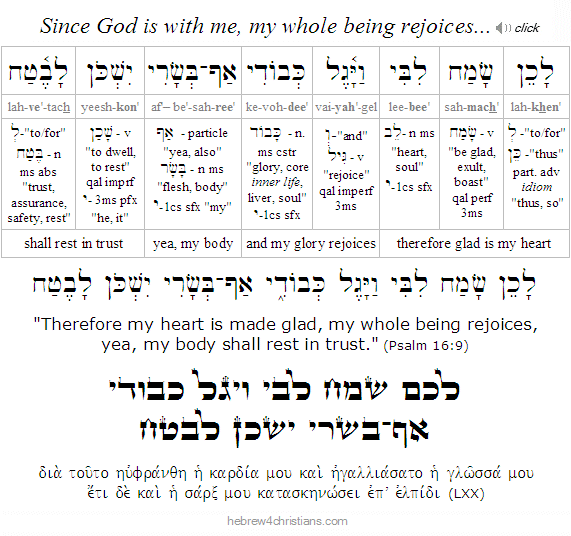 |
Suffering and hope, the two go together... Separate one from the other and you become unbalanced and double-minded (i.e., δίψυχος, "two-souled"). Those who turn away from hope in their suffering fall into despair; those who hope to turn away from suffering enter into delusion. The message of suffering presents both the call to hope and offers us comfort. Only the One who suffers "with us" (עִמָּנוּ אֵל), who clothes himself with our sorrows, our infirmities, and who understands the cry of our hearts can help truly help us. "If I must boast, I will boast about the things that show my weakness; for God has said: "My grace is enough for you, for my power is made perfect in weakness." So then, I will boast most gladly about my weaknesses, so that the power of Messiah may reside in me" (2 Cor. 11:30, 12:9).
Passion and Truth....
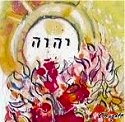
03.28.19 (II Adar 21, 5779) Revelation is unknowable apart from passion... It is common enough to draw near to God with lips while the heart is far away from Him (Isa. 29:13). God doesn't care about your "religion" if your heart is withheld, nor is He impressed that you are a member of a particular denomination (i.e., the commandments of men). Spiritually speaking, the place of utmost danger is indifference toward God, and this danger constitutes the burden of a true prophet of God. "To listen (shema) is better than sacrifice... I desire love (chesed) and the knowledge of God (da'at Elohim) more than burnt offerings" (1 Sam. 15:22, Hos. 6:6). During the End of Days people will have a "form" (μόρφωσιν) of godliness but will deny its power, since their hearts will be obstinately turned away from the truth. "And because lawlessness (i.e., ἀνομία, lit. a=without; nomos=Torah) will be increased, the love of many will grow cold (Matt. 24:12). In this connection we note that the Hebrew word for "falsehood" (or "lie") is sheker (שֶׁקֶר), which can also be read as she-kar (שֶׁקַר), meaning "that which" (-שׁ) makes you cold (קַר). The truth of God can't be known apart from passion. What sort of a lover is he who is feckless or halfhearted in his devotion? Can you know the truth about true love without yearning, longing, and desire?
The Hebrew word for sin (חֵטְא) means "missing the mark," though that essentially means missing the revelation of God's glory because lesser fears consume the heart and obscure passion of the truth... When we really see life as it is, we will be filled with wonder and awe over the glory of it all. "Fearing" (יִרְאָה) and "seeing" (רָאָה) will be linked and unified.
"There is much to drag us back, O Lord: empty pursuits, trivial pleasures, unworthy cares. There is much to frighten us away: pride that makes us reluctant to accept help; cowardice that recoils from sharing your suffering; anguish at the prospect of confessing our sins. But You are stronger than all these forces. We call you our Redeemer and Savior because you redeem us from our empty, trivial existence, you save us from our foolish fears. This is your work which you have completed and will continue to complete in us every moment." - Kierkegaard
Respect Precedes Torah...
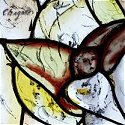
03.28.19 (II Adar 21, 5779) An axiom of the life of faith may be summarized as "respect precedes Torah" (דֶּרֶךְ אֶרֶץ קָדְמָה לַתּוֹרָה), which means that we must esteem ourselves and others properly as image bearers of God. This is foundational to all else. We must first care; we must be willing to give up our sickness; we must want to be healed. This also means that we are willing to give up blaming others and confess the truth about how we have brought pain to our lives. After we learn to forgive ourselves, we can let go of the pain, the weary anger, and forgive others of their missteps, too. It is impossible to be joyful apart from such humility. Therefore each of us must rebuff demonic impulses and turn to God for healing. And we must beseech the Lord to help us stay awake and to resist being lulled back into the unconsciousness of the world and its delusions.
Finding Real Treasure...

03.28.19 (II Adar 21, 5779) For what do you hope? What are your dreams? Your deepest desires? Where is your treasure? Yeshua cautioned those who sought their happiness in this world: "Do not store up for yourselves treasures upon earth... be rich toward God" (Matt. 6:19-20; Luke 12:21). When we treasure God, our focus is directed toward the eternal reality, and our interest in this world is minimal. We trust God to meet our daily needs and surrender our future to His care. The only worry we face concerns our own deficiencies in our obligations to the Savior. Our duty is to love God in the truth - bekhol levavkha - with all our heart, having no thought of ourselves. Indeed, self-denial means to quit thinking about yourself (from α-, "not," + ῥέω, "to speak") by accepting what God has done for you. "It is not my business to think about myself. My business is to think about God. It is for God to think about me" (Simone Weil).
מִי־לִי בַשָּׁמָיִם
וְעִמְּךָ לא־חָפַצְתִּי בָאָרֶץ
mee-lee · va·shah·mah'·yeem
ve·ee·me·kha · loh-chah·fatz'·tee · vah·ah'·retz

"Whom have I in heaven but you?
And there is nothing on earth that I desire besides you."
(Psalm 73:25)

Download Study Card
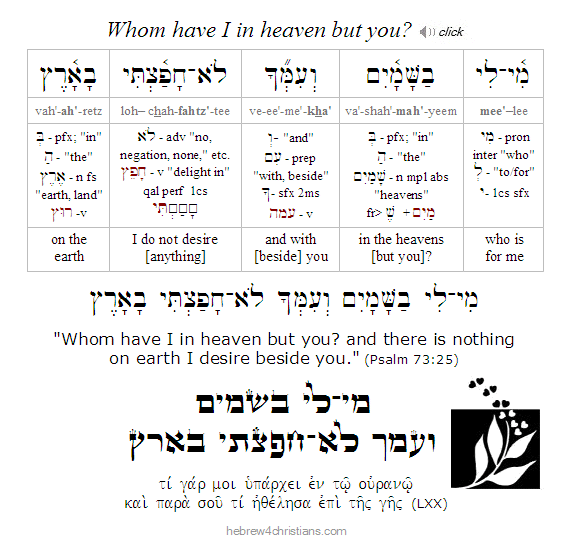
Trust despite Darkness...
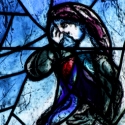
03.27.19 (II Adar 20, 5779) After the tragic death of his sons Nadav and Avihu we read: "And Aaron was silent" (Lev. 10:3). Here the sages connect surrender to God with humility, for surely the death of Aaron's two son's evoked his cry of protest, his objection before the LORD... The reason for what happens in our lives is often (always?) beyond our understanding, yet the righteousness of God's plan – even if undisclosed to us - must be accepted by faith. As it says: "As the heavens are higher than the earth, so are my ways higher than your ways and my thoughts than your thoughts" (Isa. 55:9). The refusal to accept what cannot be understood is to worship the powers of the mind, and to elevate the role of human reason above even God Himself. Faith accepts God's goodness and trusts in his care, even if that means we find ourselves walking in the dark: "Let him who walks in darkness and has no light trust in the name of the LORD and rely on his God" (Isa. 50:10).
מִי בָכֶם יְרֵא יְהוָה שׁמֵעַ בְּקוֹל עַבְדּוֹ
אֲשֶׁר הָלַךְ חֲשֵׁכִים וְאֵין נגַהּ לוֹ
יִבְטַח בְּשֵׁם יְהוָה וְיִשָּׁעֵן בֵּאלהָיו
mee · vah·khem · ye·rei · Adonai · shoh·mei·a · be·kohl · av·doh?
a·sher · hah·lakh · cha·shei·kheem · ve·ein · noh·gah · loh?
yeev·tach · be·Shem · Adonai · ve·yee·shah·ein · be·loh·hav

"Who among you fears the LORD and obeys the voice of his servant?
Let him who walks in darkness and has no light
trust in the Name of the LORD and rely on his God."
(Isa. 50:10)

Trusting in God (i.e., bittachon - בִּטָּחוֹן) does not mean that we are obligated to affirm that this is "the best of all possible worlds," though it does mean we believe that eventually God will wipe away every tear and make all things right... Bittachon is a word for this world, which says, "Though he slay me, I will trust in him..." Those who call upon the LORD can trust not only in concealed good behind ambiguous appearances ("all things work together for good") but also in a future, real, substantive good that will one day be clearly manifest for us all... We fight the "good fight" of faith, which is a worthy struggle that eventually is realized for blessing. Meanwhile, may the LORD our God keep us from such depth of sorrow that leads to sickness, darkness and despair. Faith sees the invisible light, the truth of love that overcomes all the powers of darkness, hate, and fear...
"I believe. I believe in the sun even when it is not shining; I believe in love even when feeling it not; and I believe in God, even when God is silent" (from an anonymous poem found on the wall of a cellar in Cologne, Germany, where some Jews hid from the Nazis).
If you ask for bread, your heavenly Father will not give you a stone... The sages call this a kal va'chomer inference (i.e., קַל וְחמר, "light and weighty"), namely, that if a light condition is true, then a heavier one is certainly true... Yeshua used this kind of reasoning all the time: If God cares for the needs of the birds of the air, how much more (kal va'chomer) will he care for your needs? (Matt. 6:26). If God so clothes the grass of the field, how much more (kal va'chomer) will he clothe you (Matt. 6:30)? If your heavenly Father knows the number of hairs on your head, surely he knows the state of your soul. And if God wants us to walk in righteousness, kal va'chomer does he want us to know his love... Only God can give to us the love for him that he fully knows we so desperately need; only God can deliver us from our "disordered loves" to take hold of what is truly essential. All we can do is ask, and keep on asking - even as we struggle on, despite ourselves - until we begin to understand what we really need. It's as if we are constantly being asked, "Is this what you want?" and our choices confess the truth of what we believe... Only God does the miracle of real change within the human heart - only God can give life from the dead!
Brokenness and Service...
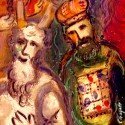
[ The following is related to our Torah reading this week, parashat Shemini... ]
03.27.19 (II Adar 20, 5779) The service of God requires the death of the ego (Luke 9:23). Rashi says that Aaron was still deeply ashamed over the Sin of the Calf, and that is why Moses urged his brother forward: "Draw near to the altar" (Lev. 9:7). And though Aaron felt inadequate and unworthy to be the High Priest of Israel, Rashi comments that he was chosen precisely because of this. His reluctance and sense of utter unworthiness was the very reason why he was granted the role of Israel's High Priest. Likewise you might feel unworthy of your high calling in the Messiah and yet you are called to come before the Divine Presence and function as God's holy priest, no less than Aaron... You are chosen in your weakness; you are beloved because of your lowly standing; you are made "pure in heart" because you realize your own inner nothingness and need before the Savior.... Your brokenness is a gift that magnifies God's unending love and grace (1 Cor. 1:26-29).
The sages sometimes say that God is closer to sinners than to "saints." God in heaven holds each person by a string. When you sin, you cut the string; but then God ties it up again, making a knot - and thereby you are brought a little closer to him. Again and again your sins cut the string - and with each further knot God keeps drawing you closer and closer." (De Mello)
Note: For more on this, see "Brokenness and Service: Further thoughts on Shemini."
Believing to See...
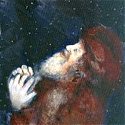
[ We believe in order to see, not the other way around. Perception is a matter of heart, and therefore we choose to see and hear what we want to see and hear (Isa. 6:10; John 12:40). ]
03.27.19 (II Adar 20, 5779) In the midst of affliction and trouble, King David exclaimed: "I would have fainted if I had not believed to see the goodness of the LORD in the land of the living" (Psalm 27:13). Despite circumstances that seemed to contradict the promise of God to establish him, David affirmed that he would outlive his anguish to behold the salvation of God. And isn't this the common struggle we all face? When we are troubled, when we feel betrayed or heartbroken, or when we become sick, we are tempted to grow weary and even to yield our hearts to the darkness of despair. David understood this. Indeed the Hebrew text for this verse does not include the words "I would have fainted" but instead says, "Unless I had believed to see the goodness of the LORD in the land of the living..." -- where the thought breaks off in "aposiopesis" (Greek, ἀποσιώπησις, "becoming silent"), suggesting that the consequent implication remains unsaid because it reduces him to desolation. David, however, turns away from this temptation and rejects it as unthinkable in light of the love and promises of God, affirming his faith in the unseen good, as he immediately adds: "Hope to the LORD; be strong and strengthen your heart; and again, hope to the LORD" (Psalm 27:14). There is healing coming to our lives. Note that the "land of the living" (אֶרֶץ חַיִּים) refers both to life in this world, ha'olam ha'zeh (העולם הזה), as well as to life in the world to come, ha'olam ha'ba (העולם הבא), where there is no more suffering and death... You may sometimes experience a painful mismatch between what you believe and how you behave; you may question how you can be a child of God and yet still struggle with sin in your heart; or you may not feel that you are a royal heir to eternal life, but nevertheless you should not let any of this lead you astray because "it is not completely clear what we shall be" (καὶ οὔπω ἐφανερώθη τί ἐσόμεθα, 1 John 3:2). Despite the various struggles we inevitably face during our journey through this life, may never lose hope in God's promise but rather "believe to see" the goodness of the LORD in the land of the living. Amen.
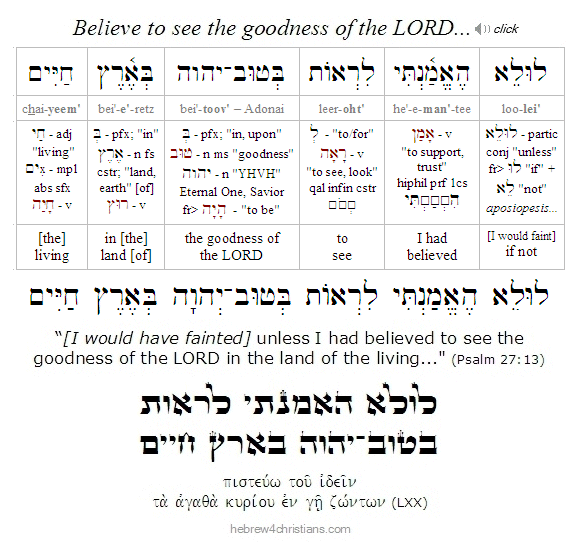 |
Sins of Presumption...

[ The following is related to our Torah reading for this week, parashat Shemini... ]
03.26.19 (II Adar 19, 5779) From our Torah portion this week (i.e., parashat Shemini) we read: "Now Nadab and Abihu, the sons of Aaron, each took his censer and put fire in it and laid incense on it and offered strange fire (i.e., esh zarah: אֵשׁ זָרָה) before the LORD, that He had not commanded them" (Lev. 10:1). The sages note that while Aaron's sons Nadab and Abihu were godly people, they did not "hear" (i.e., understand) the phrase, "that He had not commanded them" (אֲשֶׁר לא צִוָּה אתָם), because they had (wrongly) assumed that since God did not explicitly tell them not to do something (i.e., not to burn incense in the Holy Place), then it was permissible to go ahead and do that thing. However, just because God does not say that we should not to do something does not mean that we are therefore at liberty to do it. Logically speaking, all we can infer from silence is silence -- certainly not that silence communicates agreement with our desires.... Remember that it is not what God has not said that should be our concern, but rather what he has said (see Deut. 29:29).
This sort of presumption is common today, where many make a pretense of ignorance, suppressing what they don't want to hear to justify their own religious perspectives and ideologies... It takes a genuine humility to confess that we often don't know why we are doing what we are doing, and then to back up and ask for God's help and direction.
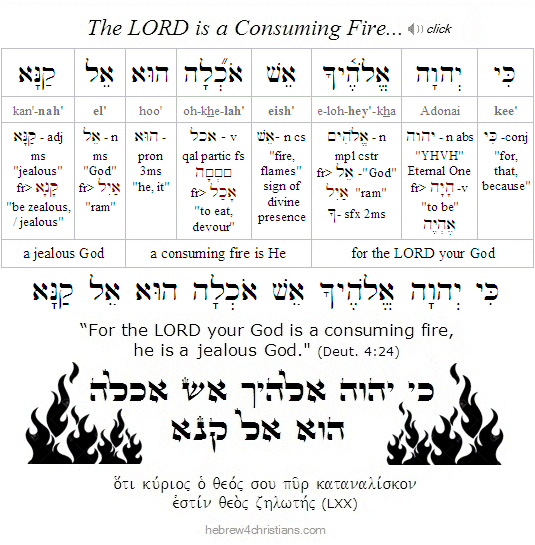 |
Humility and Spirituality...

03.25.19 (II Adar 18, 5779) God hides from the proud but reveals Himself to the "lowly in spirit" (שְׁפַל־רוּחַ), that is, to those who understand their own nothingness and complete dependence on Him.... Notice that the word dakka (דַּכָּא) refers to being crushed to the very dust, the very same word used to describe how Yeshua was crushed for our iniquities (Isa. 53:10). William James called this deep work of the spiritual life Zerrissenheit, a term that can be translated as "torn-to-pieces-hood," or a state of being utterly broken and in disarray (see William James: Varieties of Religious Experience). From the point of view of our dependence on God for salvation, dakka refers to humility and contrition we express in light of God's unmerited favor and love for our souls... We identify with the death of Messiah offered on our behalf; we find healing and acceptance in the Presence of the One who was torn to pieces and made dust for our merit. Humility is essential to awareness of God in the truth.
כִּי כה אָמַר רָם וְנִשָּׂא שׁכֵן עַד וְקָדוֹשׁ שְׁמוֹ
מָרוֹם וְקָדוֹשׁ אֶשְׁכּוֹן וְאֶת־דַּכָּא וּשְׁפַל־רוּחַ
לְהַחֲיוֹת רוּחַ שְׁפָלִים וּלְהַחֲיוֹת לֵב נִדְכָּאִים
kee · khoh · ah·mar · rahm · ve·nee·sah · shoh·khein · ad · ve·kah·dosh · she·mo:
mah·rohm · ve·kah·dohsh · esh·kohn · ve·et · dak·kah · oosh·fal · roo·ach
le·ha·cha·yoht · roo·ach · she·fah·leem · oo·le·ha·cha·loht · lev · need·kah·eem

"For this is what the high and lifted up One says, the One who abides forever,
whose Name is Holy: "I dwell in a high and holy place, but also with the broken
and lowly of spirit, to revive the spirit of the lowly and to revive the heart of the crushed."
(Isa. 57:15)

Download Study Card
Personal note: Shalom chaverim. Please offer up a prayer for Hebrew for Christians. I have been suffering from an eye infection for the last few days, or I might be having an allergic reaction due to the flooding in the house. Either way, please pray for my healing as I am having difficulty writing and reading. Thank you so much. - John
The Decree of Torah...

[ The following is related to our (additional) Torah reading for Shabbat Parah (Num. 19:1-22). ]
03.25.19 (II Adar 18, 5779) Our Torah portion for this week (i.e., Shemini) includes an additional reading (i.e., maftir) about the famous "Red Heifer" sacrifice and its meaning. The additional portion begins: "Now the LORD spoke to Moses and to Aaron, saying, 'This is the decree of the Torah... take a red cow" (Num. 19:1-2). Notice that the LORD called the red heifer sacrifice "the" decree of Torah (חֻקַּת הַתּוֹרָה), as if it were the Torah's central commandment, thereby highlighting the necessity of faith, and in particular, faith that believes that God provides healing from death by means of a divine exchange of the pure for the impure. The idea of God's substitutionary atonement, his love that empathizes and heals you of sin - is therefore the very heart of faith, that is, the central decree of true Torah. And this, of course, is the message of the cross itself: Jesus "saves people from their sins" (Matt. 1:21). Yeshua was willing to become unclean, cut off, and the bearer of your sin so that you could be made pure, clean, and accepted in exchange (2 Cor. 5:21). May He "purge you with hyssop" so that you are made whiter than snow (Psalm 51:7).
Shabbat Parah - שבת פרה

[ This coming Shababt is called "Shabbat Parah" in Jewish tradition.... ]
03.24.19 (II Adar 17, 5779) The Sabbath that immediately follows Purim is called Shabbat Parah - the "Sabbath of the Cow," when the chapter of the parah adumah (פָרָה אֲדֻמָּה), or the "Red Heifer" (Num. 19:1-22), is recited following the regular Torah service. The early sages chose this additional portion of Scripture to be reviewed at this time to help the people prepare for the coming New Year (i.e., Rosh Chodashim) and to prepare for Passover.
 |
The Red Heifer offering is considered a paradox to most Jewish thinkers, since the one who offers the sacrifice becomes unclean, while the sprinkling of the ashes of the sacrifice makes people clean... The ritual is considered "chok" (חק) within the Jewish tradition, meaning that it makes no rational sense. In fact, the Talmud states that of all the taryag mitzvot (613 commandments of the Torah), this is the only one that King Solomon could not fathom.
The Uniqueness of the Sacrifice
The Parah Adumah sacrifice was entirely unique, for the following reasons:
- It was the only sacrifice that specifically required an animal of a particular color. This animal was extremely rare and unique of its kind (in fact, Maimonides wrote, "Nine Parot Adumot were prepared from the time the Commandment was given until the destruction of the Second Temple. Moses our Teacher prepared one, Ezra prepared one and seven more were prepared until the Destruction of the Temple. The tenth will prepared by the Mashiach." (We would say "was prepared" by the Mashiach Yeshua, blessed be He.)
- It was the only sacrifice where all the rituals were carried out outside of the camp (and later, outside the Temple precincts). That is, the "blood applications" of this sacrifice occurred in a location apart from the altar (the Talmud recounts that the High Priest performed the blood applications of the Red Heifer while gazing at the Temple and at the Holy of Holies from a mountain opposite the Temple mount).
- It was the only sacrifice where the ashes were preserved and used (other sacrifices required the ashes be disposed outside of the camp).
- Hyssop, scarlet yarn, and a cedar stick would then be thrown upon the burning parah adumah (these same items were used to cleanse from tzara'at, skin disease). In other words, the blood was assimilated into the ashes of the sacrifice, which were then gathered and mixed with water to create the "water of separation" (mei niddah) for the Israelite community. Note that the word "separation" (niddah) refers to menstrual impurity and harkens to Zech. 13:1: "On that day there shall be a fountain opened for the house of David and the inhabitants of Jerusalem, to cleanse them from sin and from niddah."
- It was the only sacrifice that ritually contaminated the priest who offered it, but made the one who was sprinkled by it clean.
According to Jewish tradition, this sacrifice was to atone for the sin of the Golden Calf, though the Torah itself does not make this association. The LORD Yeshua, our Messiah, is the perfect fulfillment of the Parah Adumah, since He was completely without sin or defect (2 Cor 5:21; John 8:46); He was sacrificed outside the camp (Heb 13:13); He made Himself sin for us (2 Cor 5:21); His sprinkling makes us clean (1 Pet 1:2; Heb 12:24; Rev 1:5); and the "water of separation" that His sacrifice created is the means by which we are made clean from the impurity of sin and fit for priestly service (Eph 5:25-6; Heb 10:22).
For more about Shabbat Parah, click here.
Parashat Shemini - פרשת שמיני

03.24.19 (II Adar 17, 5779) Shavuah tov, chaverim! This week's Torah reading, called parashat Shemini ("eighth"), continues the account of the seven-day ordination ceremony for the priests (as described earlier in Parashat Tzav). During each of these "seven days of consecration" Moses served as the first High Priest of Israel by offering sacrifices and training Aaron and his sons (i.e., the kohanim or priests) regarding their duties at the mishkan (i.e., "Tabernacle"). On the eighth day however, (i.e., Nisan 1), and just before the anniversary of the Passover, Aaron and his sons began their official responsibilities as Israel's priests. In the midst of the dedication, however, tragedy struck as Aaron's sons Nadav and Abihu took it upon themselves to make their own offering before the Holy of Holies of the tent. Since this was not the prescribed means of offering sacrifice, God considered the incense offered to be "strange fire" (esh zarah) and both sons were tragically consumed by fire before the LORD (Heb. 10:29,31). Aaron was required to remaine silent as his sons' bodies were removed by his cousins, and Moses then warned Aaron's two remaining sons, Eleazar and Ithamar, not to mourn during this sacred occasion.
The portion ends with a list of which animals, birds, fish and insects are permitted or forbidden as food, which subsequently provided the framework for Jewish dietary law (i.e., kosher law). The Israelites were permitted to eat any mammal that has both a split hoof and chews its cud (Lev. 11:3). Likewise, only fish that have both scales and fins were to be regarded as kosher. A list of acceptable (i.e., non-predatory) birds was given, along with the commandment not to eat any insects unless they have a pair of jointed legs used for leaping. The dietary laws were intended to sanctify the Israelites by separating them for holiness: "For I am the LORD your God. Consecrate yourselves therefore, and be holy, for I am holy."
Providentially considered, it is no coincidence that the inauguration of the Sanctuary is directly connected to the Passover, since the daily sacrifice of the Lamb (i.e., korban tamid: קָרְבָּן תָּמִיד) served as an ongoing memorial of the Exodus from Egypt (יציאת מצרים) -- and indeed all the laws of sacrifice (תורת קרבנות) form the central teaching of the Torah itself. Reflect upon the fact that the central sacrifice of the Mishkan (i.e., "Tabernacle") was that of a defect-free lamb offered every evening and morning upon the altar in the outer court, along with matzah and a wine offering, signifying the Passover Lamb of God given sacrifice for us. This is called "God's Food" in the Torah (Exod. 29:38-42; Num. 28:4-10; John 1:29).
Beyond these Shadows...

03.22.19 (II Adar 15, 5779) Long before the time of the philosopher Plato, King David proclaimed that there was a "divided line" between the realm of the temporal world and realm of the eternal world. The temporal world is finite, subject to change, and points beyond itself to an eternal world which is the source of real significance and truth. Nevertheless, the temporal world (olam ha'zeh) is not unimportant, since how we live within the intersection of these two realms defines our posture of faith, determining our ultimate destiny... Unlike life-denying religions, we do not detach from this world, though neither do we cling to it as our home, but we are constrained to live in the paradoxical mediation of time within eternity (Rom. 8:20). In a sense, then, life in this world is a test that asks the us the question of whether we will choose to believe in the reality of love, healing, and heaven. Yes there is heartache here; yes we are in exile, at times we are profoundly lonely. We often experience the world as darkness (עוֹלָם הַשֶׁקֶר). Should we despair then, since the "outer self" returns to dust even though our "inner self" is renewed by faith (2 Cor. 4:16)? No, since God loves life and indeed the invitation of the gospel appeals to our desire to find life: darshuni vichyu: "Seek me and live" (Amos 5:4). Our ultimate concern is to "find God or die."
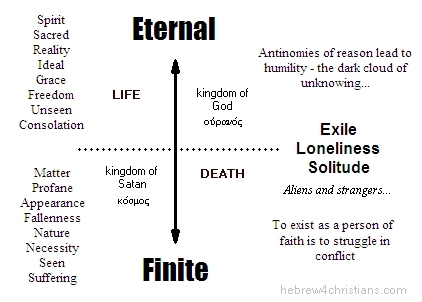 |
Surely the Lord understands our great need for healing and life, and therefore the dualism of the self and the fractured nature of reality imparts within us a sense of imbalance and even trembling as we sojourn through the "valley of the shadow of death" (Phil. 2:12). We nevertheless press on as "strangers and sojourners" (ger v'toshav), for the illusions of this world are nothing for us, and with a deep sigh of the heart we look for the completion of our redemption, our promised heavenly home. This is often difficult to do as we must both endure the vanity of this world while keeping our minds focused on what is real, true, and abiding. Like Abraham who "did not weaken in faith when he considered his own body, which was as good as dead, but was fully convinced that what God had promised he was also able to do (Rom. 4:19-21), we must take hold of the words of our Savior, who said: "I give you eternal life, and everyone who lives and believes in me shall never die" (John 11:26). Friend take heart, "for our citizenship is in heaven, and from it we await the Savior, the LORD Yeshua the Messiah, who will transform our lowly body to be like his glorious body by the power that enables him to subject all things to himself" (Phil. 3:20-21). Therefore stand firm in the LORD and the power of his might. Amen.
שִׁמְעָה־תְפִלָּתִי יְהוָה וְשַׁוְעָתִי הַאֲזינָה
אֶל־דִּמְעָתִי אַל־תֶּחֱרַשׁ כִּי גֵר אָנכִי עִמָּךְ
תּוֹשָׁב כְּכָל־אֲבוֹתָי
shee·m·ah · te·fee·lah·tee · Adonai · ve·shav·ah·tee · ha·a·zee·nah
el · deem·ah·tee · al · te·che·rash · kee · ger · ah·noh·khee · ee·makh
toh·shav · ke·khohl · a·voh·tai

"Hear my prayer, O LORD, and give ear to my cry;
hold not your peace at my tears! For I am a stranger with you,
a sojourner as were all my fathers."
(Psalm 39:12)

Hebrew Study Card
Brief Ministry Update...

03.22.19 (II Adar 15, 5779) Someone recently wrote me asking if we were still in need of support to keep the Hebrew for Christians ministry going, and the answer is yes, we are entirely dependent on kindhearted friends to both keep this ministry online and to help our family survive... We have three young children and my wife is presently enrolled in school studying to be a nurse (we are taking out student loans to pay the tuition). We are hoping that after she graduates in a few years we can use some of her income to help keep Hebrew for Christians ministry going, but meanwhile we need the help of others. I do not receive a salary from a church or other organization and therefore we operate entirely by faith, trusting in God's provision given by the kindness of his faithful children. Though we live frugally (I work from home to cut down our monthly expenses), there are many costs associated with running this ministry, including software and hardware costs, web hosting costs, and the outlay to simply pay our monthly bills. So for those of you who have so generously stood with us over the years, please accept our heartfelt thanks. Shabbat Shalom.
The Thirst for Life...

03.22.19 (II Adar 15, 5779) Spiritually speaking, there are two basic sorts of breaking. One is to be broken by the inevitable sin and ruin of this world, and the other is to have "lev-nishbar," a broken heart, before the LORD (2 Cor. 7:10). The former comes from the vain attempt to find life in the broken vessels of this world (Jer. 2:13), whereas the latter comes from the realization of an incurable inner emptiness (Matt. 5:4). The soul finds eternal satisfaction desiring God's righteousness, since God alone provides the vessel of "living water" we need to live (John 4:14; 7:38). We all must drink from God's fountain of life, lest we suffer spiritual dehydration and death. All who are thirsty, come to the waters...
Are you haunted by an inner ache for love, joy, peace, and life? "Blessed are those who hunger and thirst for righteousness, for they shall be satisfied" (Matt. 5:6). Such inner poverty is a disguised grace, and the desire for healing reveals the Spirit's invitation. Faith begins with the recognition of what we really want, since only then will we come to Yeshua for the "bread of life" and "living water." All we need is found in him, though we must reach out in faith to receive: "For without faith it is impossible to please him, for whoever would draw near to God must believe that he exists, and that he rewards those who seek him" (Heb. 11:6). God rewards those who seek him out; he answers the heart's cry; he responds to all who hope in his love and salvation. Therefore, as Yeshua said: "Ask, and it will be given to you; seek, and you will find; knock, and it will be opened to you. For everyone who asks receives, and the one who seeks finds, and to the one who knocks it will be opened" (Matt. 7:7-8). We are not saved by faith in our own faith, but in the Reality and Power of the LORD God who does the miracle of raising the dead to newness of life.
Do you have the "gift of holy desperation"? That's the very special blessing of needing God so viscerally that you otherwise will fall apart or even self-destruct apart from His ongoing intervention in your life... You pray because your very life depends on it; you believe because without God, you would be swallowed up in darkness. The fire on the altar was to be kept burning at all times (Lev. 6:12-13) symbolizing the "inner fire of the heart." How blessed it is to be full of the fire of this inner need, this relentless groaning, this constant hunger and thirst for God and his righteousness! How fortunate we are to receive daily bread from the hand of our heavenly Father.
 |
Your Reason for Being...

03.21.19 (II Adar 14, 5779) From our Torah reading for this week (i.e., parashat Tzav) we read: "This is the thing that the LORD commanded you to do, so that the glory of the LORD may appear to you: Draw near to the altar and offer your sin offering and your burnt offering and make atonement for yourself" (Lev. 9:6-7). Have you considered why you were born into this world? What is your purpose, destiny, and end? The Torah states that you were personally created by Almighty God, who breathed out the breath of life (נִשְׁמַת חַיִּים) into you, and then redeemed your life so you could know the glory of God and spiritual reality. As it is written: "Worthy are you, our Lord and God, to receive glory and honor and power, for you created all things, and by your desire they existed and were created" (Rev. 4:11). God creates all things for his glory and purposes, which indeed is the first blessing recited over the bride and groom in a traditional Jewish wedding: בָּרוּךְ אַתָּה יְהוָה אֱלהֵינוּ מֶלֶךְ הָעוֹלם שֶׁהַכּל בָּרָא לִכְבוֹדו / "Blessed are you Lord our God king of the universe, who has created all things for his glory." The purpose of life is to know and love God, to walk in His light and truth, and to glorify his compassion and grace forever...
At a traditional Jewish wedding the groom places the ring on his bride's finger and says: Harei, at mekudeshet li: "Behold, you are betrothed to me." Love and holiness are interconnected, since the beloved is set apart as sacred and treasured. May God help us see the wonder of His love for our lives: "Do not be conformed to the passions of your former ignorance, but as he who called you is holy, you also be holy in all your conduct, since it is written, "You shall be holy, for I am holy" (1 Pet. 1:14-16).
Torah of the Guilt Offering...
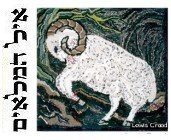
[ Purim Sameach! The following is related to our Torah reading this week, parashat Tzav.... ]
03.21.19 (II Adar 14, 5779) "This is the Torah of the guilt offering (תּוֹרַת הָאָשָׁם): it is most holy" (Lev. 7:1). Like the sin offering (חַטַּאת), the guilt offering (i.e., asham: אָשָׁם) is described as "most holy," that is, kodesh kodashim (קדֶשׁ קָדָשִׁים), because it prefigures how the sinner is restored to a place of sacred fellowship with God... Some of the Torah sages read this verse differently, however, saying: "This is the Torah - i.e., the hashkafah (הַשׁקָפָה) or "perspective" - of the one who is guilty: his own will and desire are exalted to be "most holy...." In other words, sin idolatrously elevates the human will to be supreme, and this self-exaltation creates guilt within the soul.
Word Became Flesh...

[ The following is related to our Torah reading this week, parashat Tzav.... ]
03.20.19 (II Adar 13, 5779) Our Torah portion this week (i.e., parashat Tzav) begins, "The Eternal (יהוה) spoke to Moses" (Lev. 6:8), which paradoxically refers to God as if He is a man... Theologians call this sort of language "anthropomorphism," though it plainly anticipates the great Incarnation itself, when the Timeless and Infinite One became embodied in time and space in the person of Yeshua. Indeed Yeshua is called the "Word of God" who became flesh and "tabernacled" in our midst (John 1:1,14). And just as the Angel of the LORD (מַלְאַךְ יְהוָה) mediates the Divine Presence to heavenly host, so Yeshua mediates the Divine Presence to humanity as the "Son of Man" (בֶּן־הָאָדָם). "For the Eternal One who said, 'Let light shine out of darkness,' has shone in our hearts to give the light of the knowledge of His glory in the face of Yeshua the Messiah" (2 Cor. 4:6). In the Book of Hebrews we read that "in these last days God has spoken to us ἡμῖν ἐν υἱῷ," which literally means God speaks in the language "of Son" (Heb. 1:2). The Eternal speaks as the One who emptied Himself to become one of us, who clothed himself in our humanity, so that he could touch us, empathize with us, and to ultimately die for our atonement as the "Lamb of God." There is a Purim connection, friends: Yeshua is the Word of God our Deliverer....
Faith requires you to change your everyday thinking, to go beyond natural expectations, to "walk on water." In the case of Yeshua, we are confronted with the "Absolute Paradox," namely, the God-Man, the Infinite-made-Finite, the Holy-made-Profane, the Sinless-made-Sin, who says to you: "I AM the resurrection and the life. Whoever believes in me, though he die, yet shall he live, and everyone who lives and believes in me shall never die. Do you believe this?" (John 11:25-26). You will never die; you will never hunger; you are made whole through my brokenness; you will be cleansed by my defilement, and so on. It's not just hard to believe, it's impossible, which is why it is a miracle of God to be saved (Matt. 19:26). "It is the Spirit that gives life; the flesh is no help at all" (John 6:63). The difference is Yeshua: "Salvation is of the LORD." We are enabled to love and know God by means of his inner life and spirit, not by means of good intentions or religious zeal. Faith itself is a miracle; it is the power and glory of God that genuinely transforms the human heart....
Purim and Deliverance...
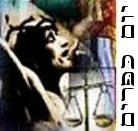
[ The festival of Purim begins this evening at sundown... Purim Sameach friends! ]
03.20.19 (II Adar 13, 5779) On Purim we remember how the Jewish people escaped from Haman's evil plot to destroy them, though according to the sages, any day that is marked by special deliverance by God may be regarded as a "personal" or "special" Purim. Therefore some Jewish families and communities celebrate "special purims" to commemorate the anniversary of a particular deliverance. The most important deliverance we have comes from being set free from the guilt of our sins, of course, since this gives us true peace with God (Rom. 5:1). In fact, Yom Kippur (the Day of Atonement) is also known as Yom Kippurim in the Tanakh, which can be read as Yom Ke-Purim, a "day like Purim." Thus the day on which Yeshua sacrificed Himself on the cross is the greatest Purim of all, since through His loving intervention we are eternally delivered from the hands of our enemies. יְהִי שֵׁם יְהוָה מְברָךְ / yehi shem Adonai mevorakh: "Blessed be the Name of the Lord."
The "ultimate" meaning of Purim, then, is to be forgiven and accepted by God on account of the winning performance, the impeccable works of righteousness, and the victory of love over judgment secured by Yeshua the Messiah at the cross (Psalm 85:10). Our deliverance depends not only on the substitutionary death of Yeshua as our kapparah (atonement), but also on the substitutionary life He lived (and still lives) on our behalf. Yeshua fulfills the Torah on our behalf. The cure for our lawlessness is not more laws but a deeper sense of God's grace given to us in Yeshua, who kept the law perfectly and ransomed us from its righteous judgment.... Because of Yeshua we have grace and peace (shalom) with God.
We must be careful not to confuse cause and effect in the realm of the spiritual. After the original transgression of Adam and Eve, death became the root problem of the human condition, so to speak, with indwelling sin as its fruit (i.e., the "works of the flesh"). It is this inherited "spiritual death" that causes sin. To focus on outward behavior without first of all dealing with the underlying problem of death is therefore a spiritual misstep. It is to clean the outside of the cup or to wash the outside of a tomb in a vain attempt to disguise the truth about our unclean and dead condition. The good news is not that God wants to make bad people good, but rather wants to make dead people alive... The cure for spiritual death is to be reborn and to partake of the resurrected life of Yeshua.
Following Yeshua is not a sort of "moral reformation" or self-improvement program to make us acceptable to God. Yeshua did not die on the cross so that we would become entangled in the old ways of being... No! He is Lord and Master and we find new life in His acts of deliverance done on our behalf and for our benefit. The temptation is always to go back to the law of sin and death (i.e., the principle of self-justification), but as Luther once said: "The sin underneath all our sins is the lie of the serpent that we cannot trust the love and grace of Christ and that we must take matters into our own hands."
"LORD, I need Thee every hour..." There never will be a time when we "get past" the need for God's grace given in Yeshua, since the only antidote to power of indwelling sin is the greater power of God's redeeming love within our hearts (1 John 3:8). The gospel is - not was - "the power of God for salvation (δύναμις θεοῦ ἐστιν εἰς σωτηρίαν) for everyone who believes" (Rom. 1:16); it is an ongoing source of power for our lives... Our identity is made secure in the finished work of the Messiah - we trust in His strength, not our own; it is "Messiah in you" that is the hope of glory (Col. 1:27). Just as we are given a new life entirely by means of God's grace, so we are also sanctified as we walk in that newness of life... "As you received Yeshua the Messiah the LORD, so walk in Him" (Col. 2:6). The focus is always on Yeshua and His righteousness and obedience... Every step of the way is a miracle and a wonder when we walk "in Messiah."
Purim and Prophecy...
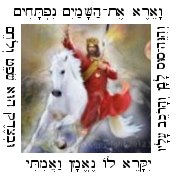
03.20.19 (II Adar 13, 5779) Both Chanukah and Purim are holidays that celebrate God's victory over the forces of darkness... Just as the prophet Daniel foresaw the events of Chanukah, that is, the rise of "Epihpanes," the "Messiah of Evil" who will one day attempt to "assimilate" all of humanity into a "New World Order" (Dan. 9:27, 2 Thess. 2:3; Rev. 13:7-9, etc.), so Purim foretells how this wicked one will attempt to destroy the Jewish people during the End of Days (אַחֲרִית הַיָּמִים), though he will be destroyed by his own wicked devices. The Midrash Esther says that Purim, unlike many of the other holidays, will be celebrated even after the final redemption after the End of Days. This is because the story of Purim -- i.e., God's covenantal faithfulness and defense of His people -- will be magnified in the deliverance that leads to the establishment of the Messianic Kingdom upon the earth. Indeed, the Second Coming of the Messiah will be regarded as the final fulfillment of Purim! So while it is a often seen as time of unbridled celebration in Israel (ad lo yoda), the holiday of Purim has a very sober prophetic message that foretells the glorious end of this age.
Here is a vision of the coming "Purim haGadol," the great deliverance:
"Then I saw heaven opened, and behold, a white horse! The one sitting on it is called Faithful and True (נֶאֱמָן וְיָשָׁר), and in righteousness he judges and makes war. His eyes are like a flame of fire, and on his head are many diadems, and he has a Name written that no one knows but himself. He is clothed in a robe dipped in blood, and the Name by which he is called is the Word of God (דְּבַר הָאֱלהִים). And the armies of heaven, arrayed in fine linen, white and pure, were following him on white horses. From His mouth comes a sharp sword with which to strike down the nations, and He will rule them with a rod of iron. And He will tread the winepress of the fierce fury of the wrath of God, the Ruler over All (παντοκράτωρ), the LORD God Almighty (יְהוָה אֱלהֵי צְבָאוֹת). On his robe and on his thigh he has a Name written, the King of kings (מֶלֶךְ הַמְּלָכִים) and the Lord of lords (אֲדנֵי הָאֲדנִים). And with the breath of his lips He will slay the wicked." - Rev. 19:11-16
May that day come speedily, and in our time...
HAPPY PURIM CHAVERIM!
Parables and Purim...
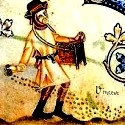
[ The festival of Purim begins tonight at sundown... Happy Purim friends! ]
03.20.19 (II Adar 13, 5779) The Hebrew word for "parable" is mashal (מָשָׁל), which means a "likeness" or "similitude," though it also can refer to a proverb or ethical maxim (as in the case of Mishlei Shlomo, the Proverbs of Solomon). In the New Testament, the word παραβολή means juxtaposition, or the casting (βάλλω) of one thing beside (παρα) another thing for the purpose of comparison or contrast. Figuratively, a parable resembles the shape of a parabola, that is, a "u-shaped curve" that goes out and turns back in on itself. Hence the parables of Jesus generally have a "twist" that is meant to turn the hearer back to question his or her own perspective, heart attitude, and so on. The purpose of the parable is to provoke us think outside of our prejudices so that we can see divine possibility in our lives.
Undoubtedly Yeshua often taught in parables because they simultaneously conceal and reveal the truth. A parable obscures the truth to those who don't really want it; just as it reveals the truth to those who do (Luke 8:9-10). Since Yeshua's whole life was a parable of sorts - a "disguise" that led to the victory of our deliverance (Phil. 2:7) - it is not surprising that he regularly used "figures of speech" to provoke people to examine their own heart attitude and faith... In this connection note that Yeshua never explained the "mysteries of the kingdom of God" directly to the crowds, nor did He ever pander to the crowd's clamor or interests. His message is always meant for the individual soul who was willing to follow Him -- to the one who had "ears to hear."
"As you go about, let people know that the Kingdom of Heaven (מַלְכוּת הַשָׁמַיִם) has come. Take care of the sick, waken the lifeless, forgive the sinner, and banish the demonic" (Matt. 10:7-8). We proclaim the truth of the kingdom when we serve as healers, caregivers, and those who seek to bring the grace of God and inner peace to others.. "Go into all the world and preach the gospel, and sometimes use words..."
Note: For more on this topic, see the Purim article, "Parables and Revelation."
The Eye of the LORD (יְדִיעַת הַכֹּל)

03.20.19 (II Adar 13, 5779) God's intimate knowledge of our lives is sometimes referred to as ayin Adonai (עֵין יְהוָה), the "eye of the Lord." The Scriptures attest that the LORD's infallible vision spans every time and space, observing both the good and evil (Prov. 15:3); His perception ranges throughout the whole earth to defend the righteous (2 Chr. 16:9) and to deliver those who are waiting for his faithful mercy (Psalm 33:18).
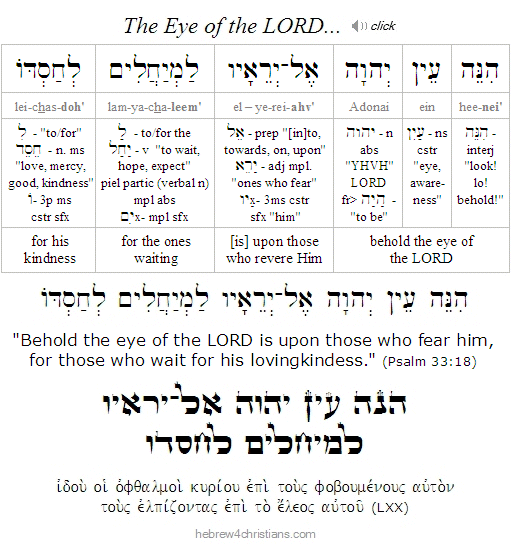 |
Sometimes you might feel as if God does not see you or pay attention to your struggle against evil. You may feel insignificant, invisible, unnoticed, perhaps anxious and alienated. This verse, however, assures us that God does indeed see you and carefully attends to the details of your life. Does the idea that God "sees" and knows everything about you - the very "numbers of the hair on your head" - fill you will a sense of comfort or anxiety? Do you regard God's omniscience as a threat or as source of strength? Some people trifle with matters of religion, but the question must be asked: Do you really want to believe?
For those of you who are willing to face the anxiety and deep questions of life, attune yourself to regard God's omniscience as part of the narrative of your journey in this world. The eye of the LORD God truly is upon you – upon you who consciously reach out to Him in reverence of heart; upon you who feel alone in your efforts to depart from selfishness and evil; even upon you who despair over the losses and shame of days wished to be long forgotten. If you are now looking to the LORD in hope of His great mercy, He indeed sees you and is present to deliver you....
Theology of Flowers...

03.19.19 (II Adar 12, 5779) "Why are you so anxious? Take a lesson from the wildflowers... They neither toil nor spin, yet even Solomon in all his royal glory was not arrayed like one of these ... And if your heavenly Father gives such attention to the appearance of flowers, many of which grow in unseen places, surely he will attend to you, too" (Matt. 6:28-30). So relax; do not let worry blind you to God's ongoing care; do not live as those without faith. As his child, you have a place in your Father's heart; you have a share in his house above. Understand the Lord God to be your Dwelling Place "in all generations"; behold his unchanging glory despite the fleeting shadows of this world...
אֲדנָי מָעוֹן אַתָּה הָיִיתָ לָּנוּ בְּדר וָדר
Adonai · mah·ohn · at·tah · ha·yee·tah · lah·noo · be·dohr · va·dohr

"O Lord God, you have been our dwelling place in every generation."
(Psalm 90:1)
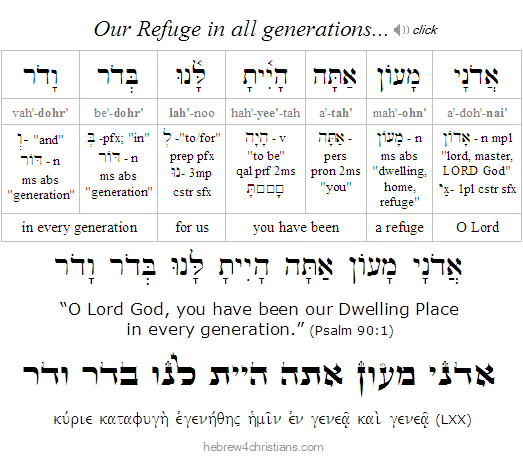
The Eternal is our refuge, our "dwelling place," in every generation, and that means in the present generation as well, on the other side of fleeting appearances of this world. When we pray to God as Avinu She-bashamayim, "Our Father in Heaven," we are calling to the One (שֶׁ) who is in (בּ) the midst of the waters (שָׁמָיִם) of Life. As we contemplate God's Eternality and power, may we realize the wonder and sanctity of our short time here.
Some people experience anxiety because they feel powerless in the face of life's changes, so they "compensate" by trying to hold on to what cannot be held: "All the desires of this world are like rays of light. You try to catch them in your hand only to find there is nothing in your grasp." Nonetheless, the heart wants life to be both real and yet unchangingly ideal, and the soul yearns for loving relationships that will not be drowned by the inevitable flow of time. In light of this deep inner conflict, the existential question we must face is whether we will "agree" to let go and trust the flow of life, or whether we will protest by demanding our own "heaven" in the here and now. Will we accept life on life's terms, or on our own? Honoring the flow of life is to honor the Father's will for us, to let go of our dread (i.e., our craving for temporal security) by trusting in His sovereign plan for all of life. We overcome anxiety by trusting that God is in the "midst of the whirlwind" of change and is supervising the end of all things according to his good and perfect purposes (Rom. 8:28).
The bloom of every flower is by eternal purpose, and not one common sparrow is forgotten by your Heavenly Father (Luke 12:6). God's irresistible providence comprehends and orders all things, in every possible world -- from the realm of the subatomic to the cosmic motions of the heavenly bodies. The LORD is the Center: "All things were created by Him, and for Him" and in Him all things consist (συνεστηκεν, lit. "hold together") (Col. 1:16-17). In light of God's providential ordering of our lives, Blaise Pascal asked, "What is left for us but to unite our will to that of God himself, to will in him, with him, and for him the thing that he has eternally willed in us and for us." The Mishnah says it this way: "Do His will as if it was your will that He may do your will as if it was His will" (Avot 2:4). In other words, what else can we do but learn to trust, accept, and to say "yes" to life -- even if at times we may feel like strangers in exile... All our days are ordained; recorded in God's scroll. Therefore may God "teach us to number our days aright that we may receive a heart of wisdom" (Psalm 90:12).
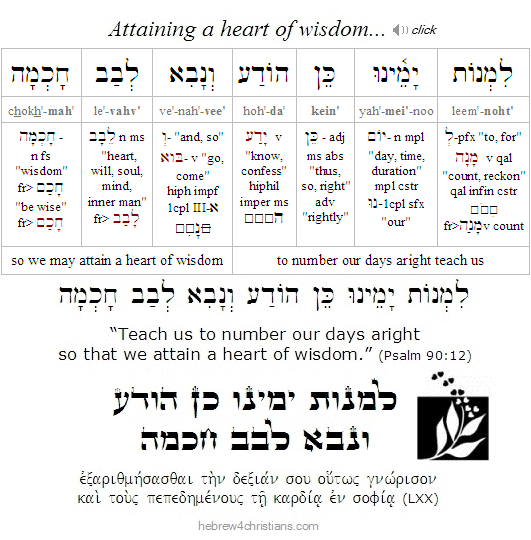 |
Hidden in Plain Sight...

[ The following concerns the holiday of Purim, which begins Wed., March 20th at sundown... ]
03.19.19 (II Adar 12, 5779) Although the Name of God (שם המבורש) is not explicitly mentioned in the Scroll of Esther (מגילת אסתר), the story is essentially about revelation, that is, the disclosure of God's Presence despite His apparent concealment. This turns on faith: we believe in order to see, not the other way around. As Blaise Pascal once said, "There is enough light for those who want to believe, and enough shadows to blind those who don't." The phrase hester panim (הֶסְתֵר פָּנִים) means "hiding of face" and is often used when trusting in the divine providence. God's plan is being fulfilled, step-by-step, even if it is hidden within the "natural" world of human beings and their choices (Jer. 10:23; Prov. 21:1). The LORD is Ha'mashgiach (i.e., הַמַּשְׁגִיחַ, the supervisor) of all things - from the motions of subatomic particles to the great events of the cosmos. He not only calls each star by its own name (Psalm 147:4), but knows each particular lily and sparrow (Matt. 6:28-30, 10:29). Indeed, each person is under the direct, personal supervision of God Himself (i.e., hashgachah pratit: הַשְׁגָּחָה פְּרָטִית) -- whether he or she is conscious of this or not. As our Lord Yeshua said, even the hairs on your head are all numbered (Matt. 10:30).
גָּדוֹל יְהוָה וּמְהֻלָּל מְאד
וְלִגְדֻלָּתוֹ אֵין חֵקֶר
gah·dohl · Adonai · oo·me·hool·lahl · me·ohd
ve·leeg·doo·lah·toh · ein · che·ker

"Great is the LORD, and greatly to be praised,
and his greatness is unsearchable"
(Psalm 145:3)

Download Study Card
The Apostle Paul taught that God "chose us [εκλεγομαι] in the Messiah before the foundation of the world" (Eph. 1:4). God called you by name -- before He created the very universe itself. "God has chosen you from the beginning for salvation through sanctification by the Spirit and faith in the truth" (2 Thess. 2:13). God loves you with an "everlasting love" (אַהֲבַת עוֹלָם) and with lovingkindness (i.e., chesed, חֶסֶד) draws you to Himself (Jer. 31:3). There is no fear in God's sovereign and irresistible love for your soul (1 John 4:18). "If God is for us, who can be against us?" (Rom. 8:31).
For more on this subject, see "Theology, Paradox, and Purim."
Drawn into His love...

03.18.19 (II Adar 11, 5779) Where it is written, "The LORD appeared to me from far away: 'I have loved you with an everlasting love (אַהֲבַת עוֹלָם); therefore with love (חֶסֶד) have I drawn you'" (Jer. 31:3), note that the word translated "I have drawn you" (i.e., מְשַׁכְתִּיךְ) comes from mashakh (מָשַׁךְ), meaning to "seize" or "drag away" (the ancient Greek translation used the verb helko (ἕλκω) to express the same idea). As Yeshua said, "No one is able to come to me unless he is "dragged away" (ἑλκύσῃ, same word) by the Father" (John 6:44). God's chesed seizes us, takes us captive, and leads us to the Savior... And may the love of the LORD indeed be upon us, even as we put our hope in Him (Psalm 32:22).
יְהִי־חַסְדְּךָ יְהוָה עָלֵינוּ
כַּאֲשֶׁר יִחַלְנוּ לָךְ
ye·hee · chas·de·kha · Adonai · ah·ley·noo
ka·a·sher · yee·chal·noo · lakh

"May your love, O LORD, be upon us,
as we hope in You"
(Psalm 33:22)

Download Study Card
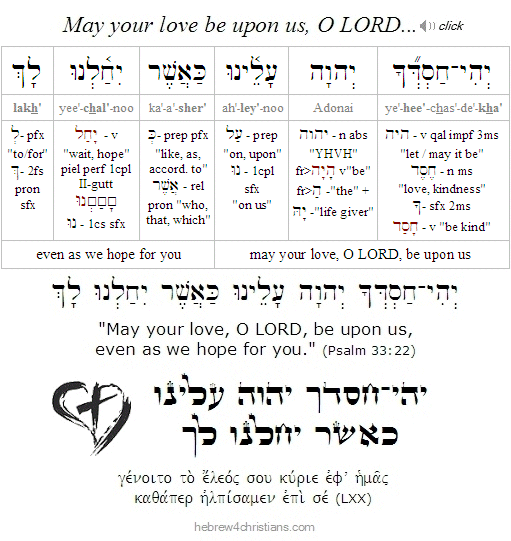
We must train our minds to see beyond mere appearances, to ignore the (fearmongering) messages of this dark world, and to search for God's truth and Presence in everything. Walking in trust of God's care for our lives casts out our fears... And (again) may the love of the LORD indeed be upon us, even as we put our hope in Him.
Patience and Healing...

03.18.19 (II Adar 11, 5779) It's been said that both the devil and God want your soul, but their approaches are diametrically opposite to one another.... God offers you a bitter cup that, after it has been duly tasted, will be turned sweet, whereas the devil offers you an artificially sweetened cup that, after it has been duly tasted, will be found bitter to the last of its dregs... When you accept your suffering as ordained by God - by the LORD of Glory who could easily deliver you from all trace of its presence in but the twinkling of an eye – your heartache is sanctified, and your praise becomes more dear to Him. Only the wise and loving LORD knows how bitter waters may be made sweet; only the great Refiner of our souls knows how to bring eternal beauty up from ashes... So heal me, O LORD (even if that means refining fire for my life), and I shall be healed; save me, O LORD (do whatever it takes to bring me to the end of myself), and I shall be saved – for you are my praise.
"Should pain and suffering, sorrow, and grief, rise up like clouds and overshadow for a time the Sun of Righteousness (i.e., shemesh tzedakah: שֶׁמֶשׁ צְדָקָה) and hide Him from your view, do not be dismayed, for in the end this cloud of woe will descend in showers of blessing on your head, and the Sun of Righteousness rise upon you to set no more for ever" (Sadhu Singh). The Sun of Righteousness does forever shine, even in the dark hours. "Heal me, O LORD, and I shall be healed; save me, and I shall be saved, for you are my praise."
רְפָאֵנִי יְהוָה וְאֵרָפֵא
הוֹשִׁיעֵנִי וְאִוָּשֵׁעָה כִּי תְהִלָּתִי אָתָּה
re·fah·ay·nee · Adonai · ve·ay·rah·fay
ho·shee·ay·nee · ve·ee·vah·shay·ah · kee · te·hee·lah·tee · ah·tah

"Heal me, O LORD, and I shall be healed;
save me, and I shall be saved, for you are my praise."
(Jer. 17:14)
Hebrew Study Card
O LORD, heal us of our wounds, or, at least help us to endure suffering with special grace to keep us from being distracted from the truth and glory of your Presence... Help us not miss seeing you; help us not trade temporal relief for a deeper healing that you may want for us. Grant us strength to abide in your hope, until the last day, to keep watch for the ready hand of Your love... As we go from place to place, from this moment to the next, help us to behold the Sun of Righteousness that pervades our way. Amen.
God's Word of Love...

03.18.19 (II Adar 11, 5779) In moments of testing, but especially in your failures, heed the voice of God's compassion (מילות רחומות). Use the "good eye" (עַיִן טוֹבָה) to see how the Spirit draws you close in your weakness, calling you to return from your self-imposed exile, welcoming you back to the Divine Presence. Note that the good eye (ayin tovah) is also called the "beautiful eye" (עין יפה), since it sees beauty even in ashes... Do not turn away from God's plea for your comfort; know that God is love (Exod. 34:6; 1 John 4:16); He is light (1 John 1:5), and He is forever with you as your Savior (Isa. 41:10; Matt. 28:20). Using the "beautiful eye" means refusing to think evil about others (including yourself); it "does not impute the bad" - οὐ λογίζεται τὸ κακόν (1 Cor. 13:5) but rejoices in the truth – even if that truth is found only in the hope of a future good (1 Cor. 13:7; Rom. 8:24). Yeshua told us, "The eye is the lamp of the body. So, if your eye is good (i.e., ἁπλοῦς, sincere, heartfelt, compassionate), then your whole body will be full of light" (Matt. 6:22).
כִּי־טוֹב חַסְדְּךָ מֵחַיִּים
שְׂפָתַי יְשַׁבְּחוּנְךָ
kee · tohv · chas·de·kha · mei·chai·yeem
se·fa·tai · ye·sha·be·choon·khah

"Because your lovingkindness is better than life,
my lips will praise you."
(Psalm 63:3)
Hebrew Study Card
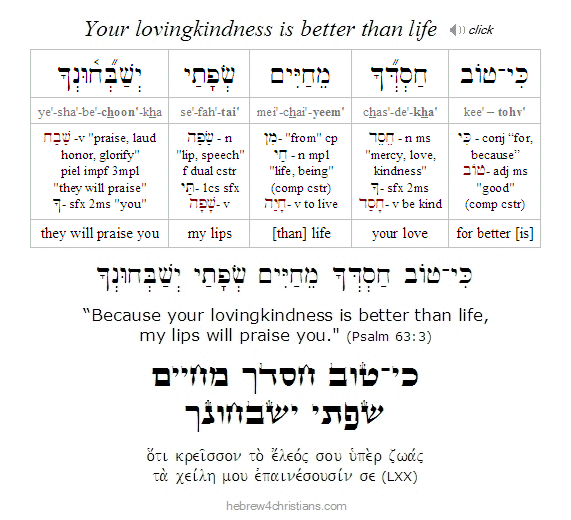
May the LORD our God help us be filled with the radiance of his truth and love... Amen.
Hiddenness and Disclosure...

03.17.19 (II Adar 10, 5779) The sages extol the importance of the holiday of Purim because it reveals the hidden hand of God, despite his apparent absence in the affairs of this world... On the surface, each turn of the story could be explained naturally, or as simple "coincidence," yet in the end we realize that God was at work behind the scenes, carefully putting together deliverance for God's people. The eye of faith trusts in God's providential plan, despite appearances to the contrary. Indeed, the phrase hester panim (הֶסְתֵר פָּנִים) means "hiding of the face" and is often used when discussing the Book of Esther. Understood as hidden providence, hester panim is somewhat like the sun on an overcast day: Just because you don't see it doesn't mean it isn't there. God's great love is at work at all times, in all affairs of the universe, whether we perceive it or not.
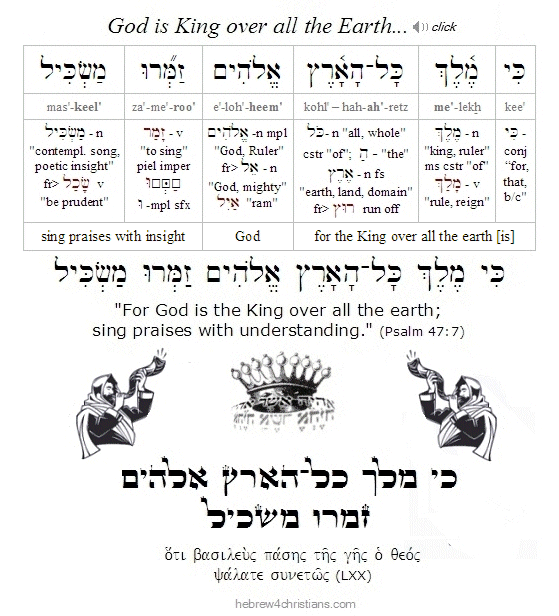 |
The holiday of Purim occurs this coming Wednesday, March 20 (at sundown) and runs through the following day. In anticipation of the coming holiday, then, let me wish you and your family Purim Sameach (פורים שמח) -- with the prayer that you will stand true to your faith, despite this wicked world and its syncretizing influences. Hooray for Mordecai! -- may the LORD raise up many like him!
Parashat Tzav - פרשת צו

03.17.19 (II Adar 10, 5779) In our Torah reading for this week (i.e., parashat Tzav) we learn how the first priests of Israel were consecrated for service by the blood of the lamb. First Aaron and his sons were washed with water, arrayed in priestly garments, and anointed with holy oil. During this ordination ceremony, a sin offering and burnt offering were offered on their behalf, and then a special "ram of ordination" (i.e., eil ha-milu'im: אֵיל הַמִּלֻּאִים, lit. "ram of abundance [מָלֵא]") was slaughtered. Some of this ram's blood was applied to the right ear, right thumb, and big toe of the Aaron and his sons (a picture of Yeshua as our suffering High Priest), and the rest of the blood was dashed upon the sides of the altar. After its slaughter, Moses took some unleavened bread and put it in the hands of the priests to perform tenufah (a wave offering) before the altar (a picture of the resurrection).
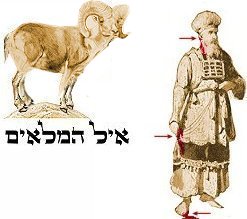 |
As followers of Yeshua, we too have been anointed with the blood from the "Ram of Ordination" -- Yeshua as our Kohen Gadol of the better covenant (Heb. 8:6). And we too have been anointed with the sacred shemen (oil) that symbolizes the presence and aroma of the LORD in our lives. As followers of Yeshua we are therefore truly "...a chosen race, a royal priesthood, a holy nation, a people for his own possession, that you may proclaim the excellencies of him who called you out of darkness into his marvelous light" (1 Peter 2:9). As Yeshua said: "You did not choose me, but I chose you and appointed you that you should go and bear fruit and that your fruit should abide, so that whatever you ask the Father in my name, he may give it to you" (John 15:16). May the LORD God of Israel be pleased to help us serve Him in the truth...
The Place of Atonement...
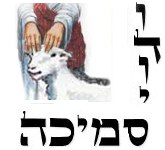
03.17.19 (II Adar 10, 5779) "He shall bring it (i.e., the sacrificial offering) to the entrance of the tent of meeting (אהֶל מוֹעֵד), that he may be accepted before the LORD. He shall lay his hand on its head and it shall be accepted for him to make atonement on his behalf (לְכַפֵּר עָלָיו). Then he shall slaughter it before the LORD, and Aaron's sons the priests shall bring the blood and throw the blood against the sides of the altar. Then he shall flay the offering and cut it into pieces..." (Lev. 1:3-6). We are justified by faith, but that means we bring our hope to the appointed place where God meets with us. We have "access by faith into this grace wherein we stand" (Rom. 5:2), and that implies we trust that God gives us right standing on account of his great love. We come to the cross - the entrance of the tent - and "lean into" our Lord, identifying with his death as atonement on our behalf. As it is written: "God has ordained a place of atonement (i.e., ἱλαστήριος, or "mercy seat" [i.e., kapporet: כַּפּרֶת]), in the cross of Yeshua, accessible through faith in his blood, for the demonstration of His righteousness, so that God might be both just and the justifier of the one who has faith in Yeshua" (Rom. 3:25-26).
It has been noted that there were no prescriptions of words to be spoken during the semikhah/shechitah ceremony (i.e., sacrificial ceremony), no formulas or ritualized prayers. The sacrifice was performed in silence. The worshipper would firmly lay both hands on the head of the sacrificial victim and reflect that this animal's fate should really be his -- i.e., that he deserved to die for his sin. Only because of the LORD's mercy was this animal accepted in his place, and therefore the sacrificial rite was ultimately one of healing and restoration... This is the "korban" principle of "life-for-life." When the LORD saw the shed blood and ascending smoke of the sacrifice, He forgave the sinner based on his faith and teshuvah (repentance). The "sweet savor" (i.e., re'ach nicho'ach: רֵיחַ־נִיחוֹחַ) of the sacrifice refers to the future life (and healing) of the worshipper -- not the sacrifice itself. By itself -- apart from genuine repentance -- the sacrifice holds no power to forgive sin, and indeed, forgiveness is a relational concept (Matt. 5:24, 6:12, Isa. 1:11, etc.). In the Levitical system, the offering of a sacrifice served as a "symbol and expression of man's desire to purify himself and become reconciled to God" (Nehama Leibowitz: New Studies in Vayikra).
"God put forward Yeshua as a propitiation (ἱλαστήριον) through faith in His blood" (Rom. 3:25). The sprinkling of Yeshua's blood - represented by His Passion upon the cross - was "presented" upon the Heavenly Kapporet, before the very Throne of God Himself. Yeshua here functions as the great High Priest after the order of Malki-Tzedek (i.e., Melchizedek) who provides everlasting forgiveness for our sins (Heb. 9:7-10:10). Because of His sacrifice, the parochet - the wall-like covering separating the Holy of Holies - was rent asunder and God's love was let loose upon the world! Baruch Hashem! All those who are trusting in Yeshua as their atoning sacrifice before God (i.e., kapparah: כַּפָּרָה) are able to draw near to God full of confidence in his love (Heb. 4:16; Rom. 5:2; Eph. 3:12).
The Sigh of Faith...

03.15.19 (II Adar 8, 5779) "We groan inwardly (στενάζομεν) as we eagerly await our redemption..." (Rom. 8:23). We sigh deeply because we are suspended between two worlds, living in the ambiguity of an already-not-yet expectation, enduring ourselves as imperfect vessels longing for perfection, trapped between what is and what will be, seeing the unseen, yearning for healing, believing that we shall never die, even as we die (John 11:26). We are restless for our eternal home and long for God's presence as we walk through shadowy vales, facing various temptations, whispering our prayers in the dark. And though we must learn endurance and trust in God's sovereign purposes, our faith nevertheless compels us to cry out, "How long, O Lord?" and "Come, Lord Yeshua" (Rev. 22:20). Over time and through our wrestling we discover that God is faithful in our temptations and will never leave nor forsake us (1 Cor. 10:13).
Our ongoing challenge is to keep a positive attitude despite the struggles we face, and therefore we inwardly pray: "Renew within me ruach nachon (רוּחַ נָכוֹן) - "a spirit of that says Yes" (Psalm 51:10). Surrender means accepting God's will for our lives -- saying "yes" to the promise of love, even if we presently feel empty inside and wonder how long we can hang in there... Saying "yes" implies saying "no" to other things - no to fear, outrage and doubt, for example. Tragically there are people who have given up hope for bitterness and despair. Asking God to give us a spirit of "yes" is really a prayer for focus, direction, and the willingness to keep pressing on to our heavenly destiny.
לֵב טָהוֹר בְּרָא־לִי אֱלהִים
וְרוּחַ נָכוֹן חַדֵּשׁ בְּקִרְבִּי
lev · tah·hohr · be·rah·lee · E·loh·heem
ve·roo·ach · nah·khohn · cha·desh · be·keer·bee

"Create for me a pure heart, O God,
and renew a willing spirit within me"
(Psalm 51:10)

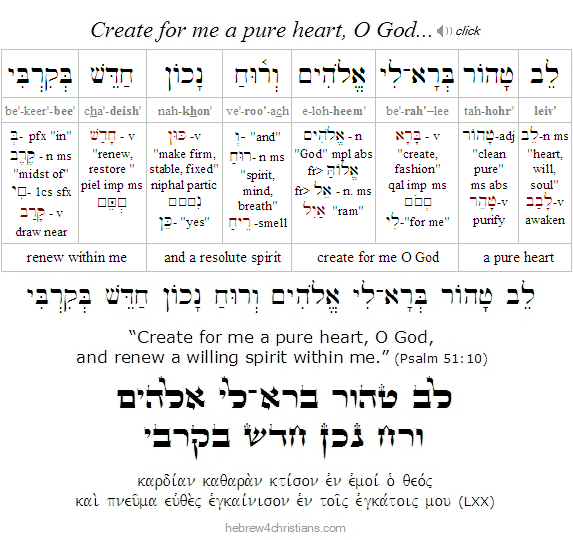
Hebrew Study Card
Though life is a struggle, we do not lose heart or faint, since even if the outer self is wasting away, our inner self is being renewed day by day. "For this light momentary affliction is preparing for us an eternal weight of glory beyond all comparison, as we look not to the things that are seen but to the things that are unseen. For the things that are seen are transient, but the things that are unseen are eternal. For we know that if the tent that is our earthly home is destroyed, we have a building from God, a house not made with hands, eternal in the heavens. For in this tent we groan, longing to put on our heavenly dwelling, that is, substance and reality..." (2 Cor. 4:16-5:3).
A Blessed Yearning....
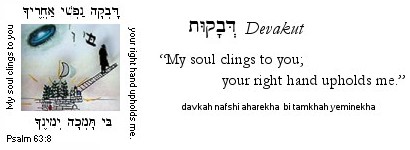
03.15.19 (II Adar 8, 5779) There is an "upside-down way" of experiencing heavenly growth and lasting prosperity, though it is not a very popular one: "It was good for me that I was afflicted, that I might learn your decrees" (Psalm 119:71). Affliction is a teacher... There is a blessing when you feel like you are "falling to pieces" because then you can know "in your bones" that only God can hold you together... Affliction serves as a "leash" of sorts, keeping us close to God's side, helping us number our days to attain a heart of wisdom (Psalm 90:12). As Yeshua said: Ashrei aniyei ha'ruach: "blessed are the poor in spirit," ki la'hem malchut ha'shamayim: "for theirs is the kingdom of heaven" (Matt. 5:3). Such inner poverty is a disguised grace, and the desire for healing reveals the Spirit's invitation. Kotzer ruach (קוֹצֶר רוּחַ) is a phrase that means being short of breath, panting for the Divine Presence, yearning for God. When you are wounded, desperate, and find nothing else within you for life, then you are able to see clearly and to receive the miracle of the divine comfort. "I know, O LORD, that your judgments are right, and that in faithfulness you have afflicted me. Let your steadfast love comfort me according to your promise to your servant. Let your tender mercies come to me, that I may live; for your Torah is my delight" (Psalm 119:75-77).
טוֹב־לִי כִי־עֻנֵּיתִי לְמַעַן אֶלְמַד חֻקֶּיךָ
tov'-lee · khee-oo·nei'·tee · le·ma'·an · el·mahd · choo·kei'·kha

"It was good for me that I was afflicted,
that I might learn your decrees."
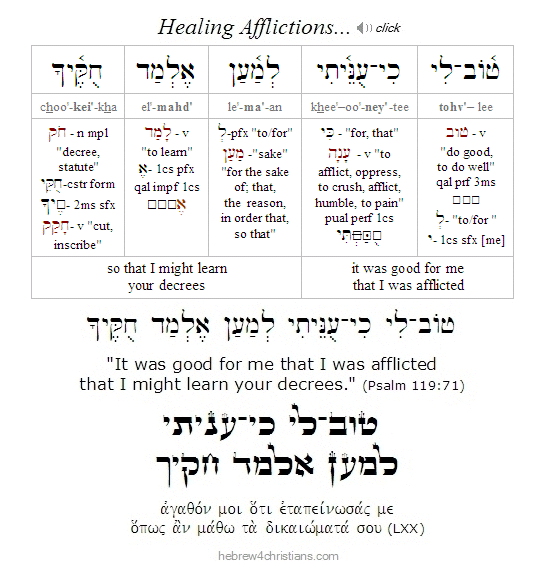
Learn to see your daily afflictions as a blessing in disguise, an opportunity for you to develop the precious middah (quality) of patience and endurance... Indeed, it is curse to be devoid of need before the LORD, and therefore affliction is a means to receiving divine comfort.
The students of Rabbi Shimon bar Yochai asked him: Why did the manna not fall once a year [as opposed to once a day]? He answered, I will give you a parable: It can be compared to a mortal king who had a son for whom he provided food once a year; as a result, he saw his son but once a year. Thereupon he provided for his maintenance daily, so that he called upon him every day. The same is with Israel. One who had four or five children would worry and say, 'Perhaps no manna will fall tomorrow, and we will all die of hunger.' Thus they turned their faces to heaven in prayer (Yoma 76a).
Just as God humbled Israel with manna in the desert, so He humbles us. "Give us this day our daily bread..." The purpose of affliction is ultimately good and healing: God humbles us with manna so "that he might make you know that man does not live by bread alone, but man lives by every word that comes from the mouth of the LORD" (Deut. 8:3). In other words, God uses the discipline of affliction to lead us to the truth. We often pray that our problems be taken away, but God sometimes ordains these very problems so that we will draw near to Him... Yeshua told us, "Your heavenly Father knows what you need before you ask Him." Many of us are slow to learn, but God is patient with those whom He disciplines. The goal is to never lose sight of what's most important, which is God Himself.
"I didn't go to religion to make me happy. I always knew a bottle of Port would do that. If you want a religion to make you feel really comfortable, I certainly don't recommend Christianity." - C.S. Lewis: God in the Dock
Torah of Atonement (תורה וכפרה)

[ The following is related our Torah reading for this week, parashat Vayikra... ]
03.15.19 (II Adar 8, 5779) The Torah's emphasis on blood atonement confounded post-Temple Jewish thought, so that the sages of the first and second centuries created "Judaism without a Temple" by claiming that "study, prayer, and good deeds" would replace the need for sacrifices at the Temple. Nevertheless, the Torah clearly affirms the need for blood atonement, and indeed over 40% (247) of the 613 mitzvot (commandments) concern the ceremonial laws of the Mishkan (Tabernacle). The Book of Leviticus is the central book of the Torah, and blood atonement by an innocent, sacrificial victim is at the heart of the law given to the priests of Israel. The Torah makes it clear that blood (דָּם) is used as a means of consecration as well as a means of obtaining atonement (כַּפָּרָה) with God. Blood was used on the doorposts of the houses in Egypt to ward off judgment and was later used to ratify the covenant given at Sinai (Exod. 24:8). All the elements of Mishkan (Tabernacle) were likewise "separated" by its use: The altar, the various furnishings of the Temple, the vestments of the priests, and even the priests themselves were sanctified by blood (Exod. 29:20-21, Heb. 9:21). But ultimately blood was used to "make atonement" for the soul upon the altar. As the Torah (Lev. 17:11) plainly states: "For the life of the flesh is in the blood (כִּי נֶפֶשׁ הַבָּשָׂר בַּדָּם), and I have given it for you on the altar to atone (לְכַפֵּר) for your souls, for it is the blood that makes atonement by the life (כִּי־הַדָּם הוּא בַּנֶּפֶשׁ יְכַפֵּר)." Blood is therefore connected to the holiness of life through sacrificial death.... Despite the sage's invention of "Judaism" without the Temple, the Torah emphatically teaches that blood is connected to the holiness of life through sacrificial death...
Unlike the "rational" (i.e., Greek) approach of the post Second Temple Pharisees, the medieval Torah commentator Nachmanides (1194-1270), or the "Ramban," regarded the sacrifices as the means to express teshuvah (repentance) by trusting in God's substitutionary sacrifice given in place of the sinner. Since we all sin by means of impure thoughts, speech, and actions, God required that when a sacrifice was presented, the sinner's hands would lean into the animal, and then he would confess with his mouth before burning the innards (kidney, fat, etc., regarded as the source of thought and lust), while pouring the blood beside the altar, "thinking that he himself is worthy of having his own blood spilled and body burned, were it not for the love of God who had received a substitute for him (an exchange) - the sacrifice atoning for him, its blood shed for his blood, its life-force for his life-force" (Nachmanides' Commentary on the Torah). In other words, there is an identity between the sinner and the sacrifice, though to be efficacious, the sinner must have faith, be moved, and turn to personally receive God's mercy and love. The sacrifice is for the sinner's sake, to help us to draw close to God, to awaken within us the desire to change. The trauma of the sacrifice is meant to so deeply move the heart that we will turn away from our apathy and indifference... Participating in the sacrifice is meant to resolutely turn our hearts back to God: As you consider the blood shed and the suffering endured so that you could be forgiven, you better appreciate the terrible cost of your sin and the awesome grace given for your sake... (Were you there when they crucified my Lord?)
Note: For more on this subject, see Parashat Vayikra: Why the Sacrifices? and "Rabbis who deny Blood Atonement."
Personal Update...

03.14.19 (II Adar 7, 5779) The lower part of our house is flooded and I've been working on the cleanup for the last 24 hours... We've had 4+ feet of snowfall over the last month and now it's thawing (and it also raining as well). Unfortunately the snow we raked off the roof of the house has created a solid ice barrier around the foundation, and somehow water trapped underneath has begun coming into the house. We are busy shoveling, carrying out things, bailing water, and so on. Please pray for us, especially that no mold or other contaminates develop because of this. Thank you dear chaverim.
Getting reading for Purim...

[ The festival of Purim begins Wed. March 20th at sundown... Happy Purim Chaverim! ]
03.13.19 (II Adar 6, 5779) The Scriptures state that the holiday of Purim "should be remembered and kept throughout every generation, every family, every province, and every city; and that these days of Purim should not fail from among the Jews, nor the memorial of them perish from their seed" (Esther 9:28). According to Jewish tradition, we remember the miracles of Purim by means of four mitzvot (i.e., blessings): 1) Honoring the appointed time as directed by the Scriptures (Esther 9:26-28); 2) Performing acts of tzedakah and kindness (Esther 9:22; i.e., misloach manot: מִשְׁלוֹחַ מָנוֹת); 3) Hearing the Megillah of Esther read; and 4) Enjoying a special Purim meal together. The Midrash Esther says that Purim, unlike many of the other holidays, will be celebrated even after the final redemption after the End of Days. Maimonides says that the Book of Esther will enjoy the same status as the Torah of Moses in the world to come (Mishneh Torah, Megillah). This is because the story of Purim -- i.e., God's covenantal faithfulness and defense of His people -- will be magnified in the deliverance that leads to the establishment of the Messianic Kingdom upon the earth. Indeed, the Second Coming of the Messiah will be regarded as the final fulfillment of Purim (Rev. 19:11-16).
Purim is all about God's irrepressible, undefeatable, insuperable and sovereign love for His people. Though the wicked seem to sometimes have the upper hand in olam ha-zeh (this present hour), we need not fret or become anxious (Psalm 37:1, Prov. 24:19, Phil. 4:6). God is in control and His love and purposes overrule the counsel of the wicked. He will one day speak to the princes of this dark world in His wrath and terrify them in His fury (Psalm 2:5). God's great vision for Zion, the "City of the Great King," will never fail, friends, nor will His love for those who are trusting in Him. God's sovereign love is our great hope. As King David said, בָּרְכוּ־נָא אֶת־יהוה אֱלהֵיכֶם / Barekhu-na et-Adonai Elohekhem: "Now bless the LORD your God" (1 Chron. 29:20). פּוּרִים שָׂמֵחַ / Purim Sameach: "Happy Purim" chaverim!
 |
HAPPY PURIM CHAVERIM!
For more information see the article: "Should Christians Celebrate Purim?"
Setting your Focus (לְרַכֵּז)...
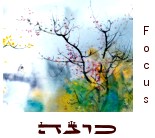
03.13.19 (II Adar 6, 5779) Politicians, advertisers, social activists, and other manipulators understand that when people are afraid, their thinking is compromised, and therefore the propaganda of the world inevitably seeks to incite anxiety, dread, terror, division, and confusion by means of disinformation delivered up through worldly culture. The way of healing is therefore to refuse to be bullied by the carefully crafted messages of deception regularly broadcast by the various "princes of this world..." We are not to be ignorant of Satan and his strategies to foment resentment, mistrust, and hatred. We must overcome the power of the lie by consciously focusing on the truth of God and the abiding Reality of the Divine Presence. As King David resolved within his heart: shiviti - "I have set the LORD always before me - because He is at my right hand, I shall not be shaken."
שִׁוִּיתִי יְהוָה לְנֶגְדִּי תָמִיד
כִּי מִימִינִי בַּל־אֶמּוֹט
sheev·vee·tee Adonai le·neg·dee tah·meed
kee · mee·mee·nee bal em·moht

"I have set the LORD always before me;
because he is at my right hand, I shall not be shaken."
(Psalm 16:8)

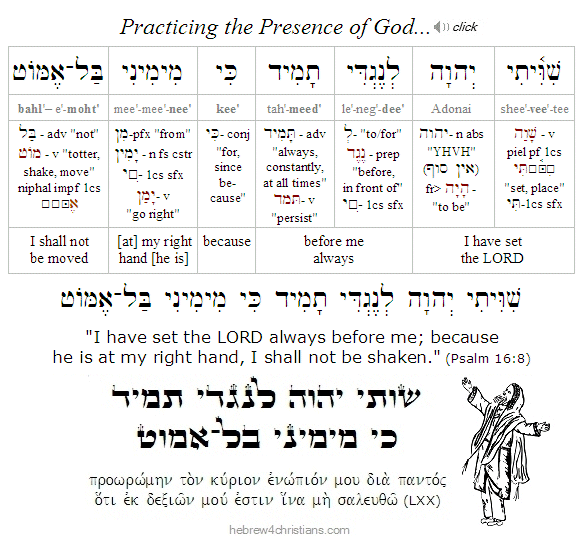
Hebrew Study Card
The Hebrew word shiviti (שִׁוִּיתִי) comes from the verb shavah (שָׁוָה) which means "to set" or place, referring to focus of the heart required to truly apprehend the Divine Presence. In this connection, we note the "korban tamid" (תָּמִידקָרְבַּן) was the sacrifice of a lamb every evening and morning upon the copper altar in the outer court -- the central sacrifice of the Tabernacle. Along with it, matzah and wine offering were required, thereby revealing the true Passover Lamb of God and his sacrifice for us (Exod. 29:38-42). That the lamb was offered twice daily hints at its two applications - the first concerning the great deliverance from Egypt by the blood of the Lamb, and the second concerning the even greater deliverance given through Yeshua, the true Lamb of God (John 1:29). Note also that the constant sacrifice of the lamb required that the fire at the altar would never be extinguished, and by extension, the duty to "care for the inner fire" of the soul. Thank God that the fire that needs tending comes from the Spirit of God within us!
But how are we able overcome our fears apart from heartfelt bittachon (בִּטָּחוֹן), that is by trusting that God is truly "with us"? The LORD is our Good Shepherd (הָרעֶה הַטּוֹב) who leads us on our way and meets our daily needs; He promises to never leave nor forsake us, especially when we are faced with difficult circumstances... There's the place of God - in the midst of the test (1 Cor. 10:13). The antidote to our fear is to find comfort in God's abiding love (1 John 4:18): God saves us from our fears (Psalm 34:4, 2 Tim. 1:7). When we trust that God personally cares for us, we find courage to face whatever may come our way...
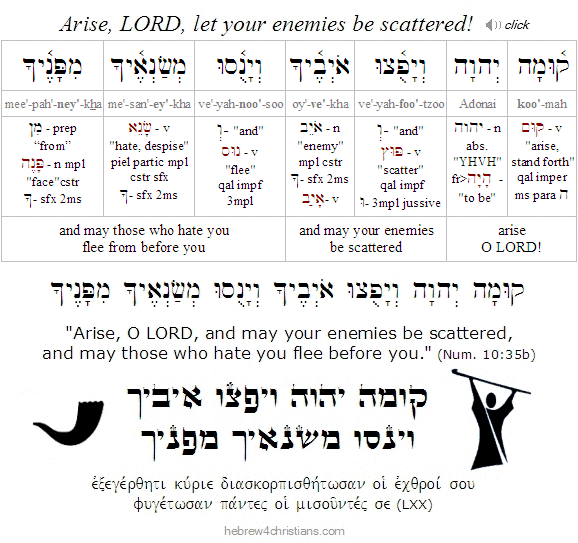 |
"Do not interrupt the flight of your soul; do not distress what is best in you; do not enfeeble your spirit with half wishes and half thoughts. Ask yourself and keep on asking until you find the answer, for one may have known something many times, acknowledged it; one may have willed something many times, attempted it - and yet, only the deep inner motion, only the heart's indescribable emotion, only that will convince you that what you have acknowledged belongs to you, that no power can take it from you - for only the truth that builds up is truth for you." - Kierkegaard
Hallowed be Thy Name...

[ The following is related to our Torah reading for this week, Parashat Emor.... ]
03.13.19 (II Adar 6, 5779) There may come a severe test of your faith, when it would be better to give up your life than to deny God's will, since God's truth is so valuable that to repudiate it would be worse than death itself... A verse from the Torah reads: "You shall not profane my holy name, that I may be made sacred among the people of Israel" (Lev. 22:32), which the early sages said provides the basis for "kiddush HaShem" (קִדּוּשׁ הַשֵּׁם), a phrase that means honoring God's truth even if that might require giving up your life to do so. (On the other hand, denying God's truth is "chillul HaShem" [חילול השם] a phrase that means disregarding God's authority over our lives.) Sanctifying God's name means we regard our relationship to God to be an end in itself - our ultimate concern - and there is therefore nothing higher that may challenge our duty before heaven. "Seek first the kingdom of God and his righteousness" (Matt. 6:33). Indeed our mortal life in this fleeting world is a means to the end of reaching our eternal destiny, and esteeming the means above the end is therefore idolatry. In other words, we exist only because of God, and when we live according to God's truth, we take a firm stand against corrupt culture by denying its godless ideology, its benighted value system, its phony relativism, its arrogant skepticism, and so on. Our faith may lead us into collision with the world and its spurious power structures: "We ought to obey God rather than men" (Acts 5:29). Taking a stand for transcendental truth will make you an outsider to the "crowd" and its endless idols and vanities. Indeed a person of genuine moral conviction may be labeled an "enemy of the state," may be persecuted as a "terrorist," and may even suffer martyrdom. Shadrach, Meshach, and Abednego rightfully defied the king's decree to bow down before the "golden image," and they confessed that they were willing to die rather than betray the truth of the LORD of Israel (see Dan 3). This is a prime example of kiddush HaShem, of honoring the truth of God even at the risk of losing our lives. For many Jews, reciting the Shema is a solemn declaration that we esteem the truth of God above all things, that God alone is our ultimate good, and that we must be willing to surrender our lives rather than to deny the greatness and glory of His Name.
כִּי־טוֹב חַסְדְּךָ מֵחַיִּים
שְׂפָתַי יְשַׁבְּחוּנְךָ
kee · tohv · chas·de·kha · mei·chai·yeem
se·fa·tai · ye·sha·be·choon·khah

"Because your lovingkindness is better than life,
my lips will praise you."
(Psalm 63:3)

Hebrew Study Card
Kiddush HaShem may be understand both literally and metaphorically. Literally understood, kiddush HaShem (i.e., martyrdom) is a possibility, one of the severest tests that may be given to the soul, and the temptation is to shrink back from the threat of death by denying the faith... Metaphorically understood, kiddush HaShem is a necessity, an essential act of the will that decides to "take up the cross" and follow Yeshua, and the temptation is to minimize the truth, to compromise the faith, and to slowly fade away... Yeshua asks, "What will it profit a person if he gains the whole world and forfeits his soul?" (Mark 8:36). Indeed, finding your life, value, and "place" here is to exile yourself from the promise of heaven. As Yeshua said, "Whoever finds his life will lose it, and whoever loses his life for my sake will find it" (Matt. 10:39). What is required, in other words, is categorically everything, with nothing left over...
We see an example of both chillul HaShem and kiddush HaShem in the life of the Apostle Peter. On the one hand, though he had boldly professed that he would be willing to die for Yeshua, he later denied that he even knew his Savior and friend (Luke 22:33-34)... After his teshuvah (i.e., repentance) however, Peter became wholehearted and fearless, and Christian tradition says he eventually died as a martyr under the tyranny of the Roman Emperor Nero... Likewise, in our effort to relate to people of different faith, we may be tempted to soften the demands of the gospel or to minimize the deity of Messiah. Sadly I've seen this happen a lot among Gentiles who get so enamored with the Jewish roots of the Christian faith that they begin to question, then outright deny the central Torah of our Messiah. We do not confuse the covenants of God, for this leads to double-mindedness and is regarded as spiritual adultery (see Rom. 7:1-4). It is chillul HaShem - the desecration of the Name above all Names - to turn away from the meaning and message of the cross of Messiah (Gal. 6:14; 1 Cor. 2:2). The price of being loyal to Messiah is mesirut nefesh (מְסִירוּת נֶפֶשׁ) -- surrendering your life by "taking up the cross." The cross is a scandal to religion and all other attempts to deny the truth about the human condition (Gal. 5:11).
The first thing the life-giving Spirit says is that you must enter into death... You must first die to every merely earthly hope, to every merely human confidence; you must die to your selfishness..." (Kierkegaard: For Self Examination)
As Yeshua said, "Do not be anxious about tomorrow, for tomorrow will be anxious for itself. Sufficient for the day is its own trouble" (Matt. 6:34). Kierkegaard comments: "If there is no next day for you, then all earthly care is annihilated. When the next day comes, it loses its enchantment and its disquieting insecurity. If there is no next day for you, then either you are dying or you are one who by dying to temporality has grasped the Eternal, either one who is actually dying or one who is really living... The one who rows a boat turns his back to the goal toward which he is working. So it is with the next day. When, with the help of the Eternal, a person lives absorbed in today, he turns his back to the next day. The more he is eternally absorbed in today, the more decisively he turns his back to the next day." Amen. May God help us live for Him today, the day of salvation; today may we hear His voice.
Word for the Brokenhearted...

03.12.19 (II Adar 5, 5779) I am bewildered whenever a Christian advocates "Torah observance" as the way to please God, since the central problem of the human heart is that we cannot do this very thing, and that it is quite impossible to obey even the very first commandment, namely, to love God with all our hearts... If we are honest with ourselves, we will confess that we are inwardly broken, double-minded, even serial hypocrites -- and yet somehow we are led to believe that after we receive the good news of God's love and forgiveness found in Yeshua, we must begin anew to live under the law and to seek God's approval through obedience... No, a thousand times no! Yeshua did not come to "reinvent" Moses but to radically transform our hearts by giving us a supernatural inner nature...
The most profound of illusions is that we "can do this" -- we can "follow Yeshua" and please God by our own efforts, by an act of will, through our own obedience... We think that we are extended grace "to enter in," but after this we are left to our own devices and must generate our own sense of commitment... No. As A.W. Pink once said, "The great mistake made by people is hoping to discover in themselves that which is found in Christ alone..." As I've said before, there is not one gospel message for the sinner and another for the saint. We will always need the life-giving gospel message, which is the word of deliverance spoken now - today - to sinners like us...
The message of the gospel is a "two-edged sword" -- it is indeed "good news" to those who are sin-sick and riddled with guilt and shame, but it is "bad news" for those who deny their inner condition before God and believe that they can justify themselves. In other words, there is no "gospel" message apart from the message of the cross of Yeshua, and the cross represents the end of the ego and its devices. We don't get saved in order to follow the path of self-righteousness; we get saved to be witnesses of God's righteousness... We love God because He first loved us (1 John 4:19). We are sanctified in precisely the same way we are justified - by God's grace alone... There never will be a time when the walk of faith involves what Yeshua has done for me plus something I can bring to the table. "He must increase, but I must decrease" (John 3:30).
Many people get the message of the cross backwards, and I am afraid this is especially true of so-called Messianic believers. "Are you so foolish? Having begun by the Spirit, are you now being perfected by the flesh?" (Gal. 3:3) The message of law is "if you behave, then you belong," which induces an alternating sense of entitlement and despair. The message of the cross is, "if you believe, then you belong." Believe what? In God's love for you - that you are made accepted and worthy because of that love... Paradoxically, by truly accepting that you are accepted -by personally receiving the love of God for your soul - you will find your heart hungering for obedience, and the true intent of the Torah will be written upon your heart.. But note carefully that the Torah will be written upon the broken heart, not the heart of stone... The gospel message is for sinners, not for the self-righteous or for those who think they can "do this thing." The veil in the Temple has been rent asunder: "We have an altar from which those who serve the Mishkan have no right to eat" (Heb. 13:10)
אָנכִי אָנכִי הוּא מחֶה פְשָׁעֶיךָ לְמַעֲנִי
וְחַטּאתֶיךָ לא אֶזְכּר
a·no·khi · a·no·khi · hu · mo·cheh · pe·sha·ey·kha · le·ma·a·ni
ve·cha·to·tey·kha · lo · ez·kor

"I, even I, am He who blots out your transgressions for My own sake
and I will not remember your sins"
(Isa. 43:25)
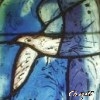
The Circle of Communion...
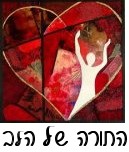
03.12.19 (II Adar 5, 5779) It is written in our Torah that the LORD spoke to Moses 'face to face' (i.e., panim el panim: פָּנִים אֶל־פָּנִים), "as a man speaks to his friend" (Exod. 33:11). During the heartache of his pilgrimage "to the heavenly city" Moses had appealed to the LORD: "You have said to me - yadati'kha ve'shem ve'gam matza'ta chen be'einai - 'I know you by name and you have found grace in my sight...' now therefore, if I have found grace in your sight, please show me now your ways, that I may know you in order to find grace in your sight" (Exod. 33:12-13). I love this roundabout plea of the heart: "If I have found grace in your sight let me know You in order to find grace in your sight." What a beautiful circle of communion: it is all of grace, beginning with God's love, sustained by God's love, and completed by God's love. To know God in the truth, to have "face to face" communion with God, therefore means being able to speak to God freely from the heart, without fear of being rejected or abandoned. "If I have found grace in your sight" – that is, if I am accepted within your heart – then let me know this very thing so that I may find grace in your sight... Moses' appeal was that since God so loved him, then may his heart truly embrace this love so that he could go deeper in his communion with the LORD. Essentially Moses cried out for self-acceptance despite his own sense of radical unacceptability... Moses was given God's assurance. In the passion of his intercession the LORD responded to him: "This very thing that you have spoken I will do" -- ki matzata chen be'einai va'eida'akha be'shem -- "for you have found favor in my sight and I know you by name" (Exod. 33:17).
Testing and Offense...

03.12.19 (II Adar 5, 5779) People today are quick to take offense, made prisoners of their own insecurities... Ironically, the more you seek your own honor, the less you'll find. Turn yourself around; get out of yourself: "Whoever exalts himself will be humbled, and whoever humbles himself will be exalted." "If anyone would be first, he must be servant of all" (Mark 9:35). "And blessed is the man who is not offended" (וְאַשְׁרֵי הָאִישׁ אֲשֶׁר לא־יִכָּשֵׁל).
The devil and his political advocates in this world seek to "divide and conquer" people by impugning the meaning of everyday language to engender a "hermenuetic of suspicion." The evil one then inculcates self-policing anxieties within the heart to manipulate and terrify people of conscience: he uses equivocation to sow seeds of mistrust, envy, and hatred based in ignorance. Satan's first job is to make people stupid -- literally in a state of unthinking "stupor..." The antidote here, and that which restores us to sanity, is the sacred truth of the LORD God Almighty. All people are created be'tzelem Elohim (בְּצֶלֶם אֱלהִים), intended to be image-bearers of the Divine, and each soul will give account for its life – for every careless thought, word, and deed. As it is written, "No creature is hidden from his sight, but all are naked and exposed to the eyes of him to whom we must give account" (Heb. 4:13). Refuse, therefore, to take offense over anything - over perceived insults, over attacks on your character, and especially over the news (i.e., propaganda) of this evil world, friends. All things come from the hand of God to test you; to refine what is in your heart... Forsake the outrage of your heart; give up your personal "rights" and surrender yourself to the providential care of your Heavenly Father. But regarding the affairs of this world, understand that the nations are tohu (תהוּ), "confusion and unreality" (Isa. 40:17), and that the schemes of worldly men are ultimately doomed (Psalm 1:6). Ein od milvado: God is the only true Power; the LORD God Almighty is the great King over all the earth (Psalm 47:7).
 |
The "Small Aleph" of Revelation...
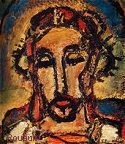
[ The following is related our Torah reading for this week, parashat Vayikra... ]
03.11.19 (II Adar 4, 5779) The first verse of the Book of Leviticus is usually translated: "And the LORD called to Moses and spoke to him," where the subject of the verb vayikra (וַיִּקְרָא), "and he called," has an implied antecedent, which if expressed would read: "And the LORD called to Moses and the LORD spoke to him..." The Hebrew text of the Torah scroll is written with a small Aleph (א) at the end of the verb vayikra, however, indicating something of textual and grammatical interest. Note that the Hebrew letter Aleph is constructed from two Yods (each that represent a yad, or "hand") joined by a diagonal Vav (that represents a man). One Yod (י) reaches upward while the other reaches downward, and both extend from the "fallen" Vav (ו), picturing Yeshua, the humble One who was "wounded for our transgressions, and bruised for our iniquities" as our Mediator between heaven and earth (Isa. 53:5; 1 Tim. 2:5). The implied subject, then, of vayikra can be seen to be the "small Aleph," the Humble One who calls out from the Tent of Meeting...
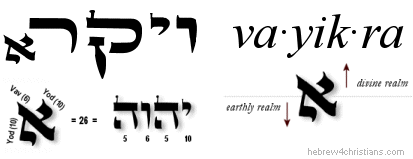 |
Aleph is the first letter of the first word of the first commandment of God: anokhi (אָנכִי): "I AM" (Exod. 20:2), which also designates the Name ehyeh (אֶהְיֶה) first revealed to Moses (Exod. 3:14). The numerical value of Aleph is one, indicating its preeminence, and it is a silent letter, alluding to the ineffable mystery of God's sovereign will (the related word aluph (אַלּוּף) means "Master" or "Champion"). In the Hebrew script used for writing Torah scrolls (ketav Ashurit), Aleph is constructed from two Yods (that represent "hands") joined by a diagonal Vav (that represents man). One Yod (י) reaches upward while the other reaches downward, and both extend from the "fallen" Vav (ו), picturing a "wounded Man" or Mediator (1 Tim. 2:5). In the Hebrew numbering system (i.e., gematria), Yod = 10 and Vav = 6, so adding up the three parts of Aleph yields 26, the same value as the Name of the LORD: YHVH (יהוה). The very first letter of the Hebrew Alphabet, then, pictures the three-in-one LORD who mediates all of life for our salvation. And just as there are three parts to Aleph, but Aleph is One (echad: אֶחָד), so there are three Persons to the Godhead, yet God is absolutely One. Indeed, the gematria of the word Aleph (אָלֶף) is 111 (Aleph=1, Lamed=30, and Pey=80). As Yeshua said, every "jot and tittle" of Scripture is significant...
"And he called" is written anonymously, but once you understand that this is the Word of the LORD speaking, you will turn back to the Creator and then YHVH will speak to you from within the Tent of Meeting...
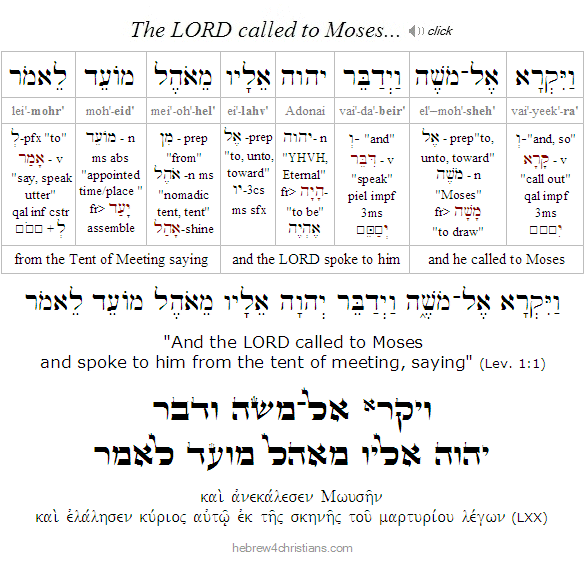 |
Leviticus and the Lamb...
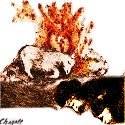
03.11.19 (II Adar 4, 5779) The Book of Leviticus is the third of the Torah, representing another stage in our spiritual journey. Genesis reveals both our divine origin but also our tragic fallenness, and the book ends with our need for deliverance from bondage to Egypt. Exodus reveals that we are liberated from slavery by trusting in the provision of God demonstrated by the sacrifice of the Passover lamb, and the book ends with the climax of the revelation of Torah given at Sinai, namely, the building of the Mishkan (Tabernacle) where the need for blood atonement was enshrined. Indeed blood atonement is the central theme of the central book of Torah, i.e., Leviticus, where we are called to draw near to God through sacrificial rites, the foremost of which was the ongoing offering (i.e., korban tamid: קָרְבַּן תָּמִיד) of a defect-free male lamb, together with unleavened bread and wine. The LORD called this "My offering, My bread" (Num. 28:1-8). In other words, the center of the Torah is the altar that constantly prefigured the Lamb of God who would be offered up to secure our eternal redemption (John 1:29; Heb. 9:11-12).
רָאוּי הַשֶּׂה הַטָּבוּחַ לְקַבֵּל גְבוּרָה
עשֶׁר וְחָכְמָה וְכּחַ וִיקַר וְכָבוֹד וּבְרָכָה
ra·uy · ha·seh · ha·ta·vu·ach · le·ka·bel · ge·vu·rah
o·sher · ve·chokh·mah · ve·ko·ach · vi·kar · ve·kha·vod · uv·ra·kha

"Worthy is the Lamb who was slain, to receive power and wealth and wisdom
and might and honor and glory and blessing"
(Rev. 5:12)

Download Reading Card
Though God instructed each household to select its own defect-free lamb for the family Passover, the Torah refers to "the" Lamb of God, as if there was only one: "You shall keep it [i.e., the Passover lamb] until the fourteenth day of this month, when the whole assembly of the congregation of Israel shall slaughter him (אתוֹ) at twilight (Exod. 12:6). Indeed there is only one great Lamb of God "slain from the foundation of the world," namely, the One given in the Garden of Eden (Gen. 3:21), sacrificed in place of Isaac during the Akedah, selected for the Passover from Egypt (and later commemorated as korban tamid (the daily offering) at the Temple (Num. 28:1-8)), later incarnated as our Savior, the great Lamb of God who offered Himself upon the cross for our sins (John 1:29), and who ascended to eternal victory to be seated upon the very Throne of God's Glory (Rev. 5:12-13; Rev. 22:1). Amen, the Torah centers on the great Lamb of God....
The LORD Calls Out - ויקרא
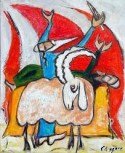
[ This week we begin a new book of Torah, sefer Vayikra (i.e., the book of Leviticus)... ]
03.10.19 (II Adar 3, 5779) Our Torah reading for this week is Vayikra ("and he called"), the very first portion from the Book of Leviticus (ספר ויקרא). In Jewish tradition, the Book of Leviticus is sometimes called the "Book of Sacrifices" (ספר הזבחים) since it deals largely with the various sacrificial offerings brought to the altar at the Mishkan (i.e., Tabernacle). Indeed, over 40 percent of all the Torah's commandments are found in this central book of the Scriptures, highlighting that blood atonement is essential to the Torah. After all, since the revelation of the Tabernacle was the climax of the revelation given at Sinai, the Book of Leviticus serves as its ritual expression, as it is written: "For the life of the flesh is in the blood, and I have given it for you on the altar to make atonement for your souls, for it is the blood that makes atonement (kapparah) by the life" (Lev. 17:11).
Unlike narrative portions of other books of the Torah, the Book of Leviticus begins with the LORD "calling out" (i.e., vayikra) to Moses to explain that the way to draw near to Him is by means of atoning sacrifice. It is noteworthy that throughout the book, only the sacred name of the LORD (יהוה) is used in connection with sacrificial offerings, and never the name Elohim (אֱלהִים). This suggests that sacrificial offerings were given to draw us near to experience God's mercy and compassion rather than to simply appease His anger.... In other words, the Name of the LORD represents salvation (i.e., yeshuah: יְשׁוּעָה) and healing for the sinner, not God's judgment (John 3:17). Indeed, the word korban (קָרְבָּן), often translated as "sacrifice" or "offering," comes from a root word karov (קָרַב) that means to "draw close" or "to come near" (James 4:8). The sinner who approached the LORD trusting in the efficacy of the sacrificial blood shed on his or her behalf would find healing and life...
Note that the word in the ancient Greek translation of the Torah (called the Septuagint) that was selected to translate the Hebrew word kapporet (i.e., "mercy seat") is hilasterion (ἱλαστήριον), sometimes translated "propitiation." The New Testament picks up this usage in Romans 3:25: "God put forward Yeshua as a propitiation (ἱλαστήριον) through faith in His blood." In other words, the shedding of Yeshua's blood - represented by His Passion upon the cross - was "presented" upon the Heavenly Kapporet, before the very Throne of God Himself for our atoning sacrifice (i.e., kapparah: כַּפָּרָה) before God.
Purim and Shabbat Zakhor...

[ The holiday of Purim begins Wed. March 20th at sundown this year... ]
03.10.19 (II Adar 3, 5779) Four special Sabbaths occur just before the start of spring: two before Purim and two before Passover. Collectively, these Sabbaths are called "The Four Shabbatot" and four additional Torah readings (called Arba Parashiyot, or the "four portions") are read on each of these Sabbaths in preparation for the holidays.
The Sabbath that immediately precedes the holiday of Purim is called Shabbat Zakhor - the "Sabbath of Remembrance." The maftir (additional reading) instructs us to "remember" (זָכוֹר) how the nation of Amalek attacked the Jews at Rephidim immediately following the Exodus from Egypt (see Exod. 17:8-16). After Israel routed the attack, God told Moses, "Write this as a memorial in a book and recite it in the ears of Joshua, that I will utterly blot out the memory of Amalek from under heaven" (Exod. 17:14). Moses later explained that Amalek did not fight using conventional methods of war but rather attacked and killed the weakest members of Israel, "those who were lagging behind" in the camp (Deut. 25:17-19). This cowardly approach represented the first attack of God's newly redeemed people, a Satanic assault that God vowed never to forget.... Amalek therefore embodies satanic forces arrayed against the people of God.
Note that the name "Amalek" (עֲמָלֵק) begins with the letter Ayin (symbolizing the eye) and equals 240 in gematria -- the same value for safek (סָפֵק), the Hebrew word for doubt. Amalek therefore suggests "the eye of doubt," or even "the severed eye" (the Hebrew verb מָלָק means "to chop" or "sever" in reference to the "eye" of Ayin). Amalek therefore represents spiritual blindness as it acts in the world...
The additional Haftarah portion for this Sabbath (i.e., 1 Sam. 15:2-34) speaks of how King Saul later failed to "devote to destruction" the evil tribe of Amalek -- a mistake which cost him the kingship of Israel. Samuel's rebuke of Saul's compromise is always timely: "Behold, to obey is better than sacrifice, and to listen than the fat of rams.... Because you have rejected the word of the LORD, he has also rejected you from being king."
These two readings were selected before Purim because Haman was an "Agagite" (Esther 3:1), i.e., a direct descendant of Agag, the king of Amalek (whom Saul nearly spared, see 1 Sam. 15:32-33), and we should therefore link the 'wiping-out' of Haman with the 'wiping-out' of Amalek. The spiritual war between the light and the darkness admits of no compromise. For more information about this Sabbath, click here.
The Holiday of Purim (חג פורים)

03.10.19 (II Adar 3, 5779) The festive holiday of Purim (פּוּרִים) celebrates the victory of the Jewish people over the dark forces of anti-Semitism in the world. In a sense, the entire holiday is a spoof or joke made at the expense of those who senselessly hate the Jewish people (and who therefore hate the God of Israel). Purim is therefore both a time of irony and a time to celebrate how God secretly acts on behalf of His people so that they will eventually triumph over their enemies.
 |
Throughout the centuries and in various places, many have tried to destroy the Jewish people, but none has succeeded. עַם יִשְׂרָאֵל חַי / am Yisrael chai: "The people of Israel live!" Israel is God's "super sign" that He is faithful to His covenant promises (Jer. 31:35-37). Christians likewise can trust that God's sovereign hand works all things together for good -- even if at times things appear bleak and desperate (Rom. 8:28).
This year Purim is celebrated Wednesday, March 20th (at sundown), that is, on the 14th of II Adar, the day after Haman's roll of the dice indicated that the 13th of Adar was most "propitious" date to exterminate the Jews of Persia. Note that Purim is celebrated the day after since it was at that time that the Jews experienced the joy of their deliverance (in Israel, Purim is observed a day later still (i.e., on Adar 15th) and is called Shushan Purim).
Mercy and Grace...

03.08.19 (II Adar 1, 5779) It's been said that "mercy" is not getting what you deserve (i.e., judgment/condemnation), whereas "grace" is getting what you don't deserve (i.e., favor/eternal life). Mercy forgives sin and guilt, but grace reaches out in love to the offender -- even to the point of suffering the penalty of the offence on the offender's behalf... "God shows his love for us in that while we were still sinners, Messiah died for us" (Rom. 5:8).
The pattern therefore abides: First you realize you are broken, impoverished of heart, and you therefore mourn over your sinful condition. Then you hunger and thirst for God's righteousness, for his healing and deliverance, and you learn to trust the mercy of God, that is, you come to accept that you are accepted despite your unacceptability. You begin to show yourself mercy; you learn to "suffer yourself" and forgive your own evil, and then you extend this mercy to others who are hurting around you... The failure to extend mercy, to demand your "rights" or hold on to grudges, implies that you are relating to God as Judge rather than as Savior (James 2:13). If we condemn what we see in others, we have yet to truly see what is within our own hearts; we have yet to see our desperate need for God's mercy for our lives. If you don't own your own sin, your sin will own you. Being merciful is a response to God's love and therefore is essential to genuine teshuvah... Ask the LORD to help you let go of the pain of the past by being full of mercy toward yourself and others.
God's love calls those of suffering heart to return to Him.... King David wrote, "You have said, 'Seek my face,' and my heart says to you, 'Your face, LORD, do I seek'" (Psalm 27:8). This is the "antiphon" of the Shema: God calls us to hear His Voice, so we are right to earnestly ask Him to be divinely enabled to hear what the Spirit is saying...
לְךָ אָמַר לִבִּי בַּקְּשׁוּ פָנָי
אֶת־פָּנֶיךָ יְהוָה אֲבַקֵּשׁ
le·kha · a·mar · lee·bee · ba·ke·shoo · fa·nai
et · pa·ney'·kha · Adonai · a·va·keish

"You have said, 'Seek my face,' my heart says to you,
'Your face, LORD, do I seek'" (Psalm 27:8).
King David asked for God's direct and miraculous intervention to heal his soul: "Cause me to me hear your lovingkindness in the morning, for in You do I trust. Cause me to know the way I should go, for I lift up my soul to you" (Psalm 143:8). David's request was that he would be empowered to hear God's loving voice calling to his heart at the start the day, to be assured of God's kindness and favor. Note that the Hebrew verbs used in this verse are both hiphal imperatives, implying that God is the agent or cause of the action. We lift up our heart in expectation, understanding that the LORD alone is the One who is able to draw us near to Him: "You [God] cause me to hear... You [God] cause me to know..."
הַשְׁמִיעֵנִי בַבּקֶר חַסְדֶּךָ
כִּי־בְךָ בָטָחְתִּי
הוֹדִיעֵנִי דֶּרֶךְ־זוּ אֵלֵךְ
כִּי־אֵלֶיךָ נָשָׂאתִי נַפְשִׁי
hash·mee·ei'·nee · va·bo'·ker · chas·de·kha
kee-ve·kha · vah·tach'·tee
ho·dee·ei'·nee · de'·rekh-zoo · ei·leikh
kee · ei·ley'·kha · nah·sa'·tee · naf·shee

"Cause me to me hear your lovingkindness in the morning,
for in You do I trust.
Cause me to know the way I should go,
for I lift up my heart to you"
(Psalm 143:8)
The salutation, "Grace, mercy, and peace from God" (χάρις ἔλεος εἰρήνη ἀπὸ θεου) appears in several places in the New Testament epistles, though perhaps the best example of how the two words "mercy" and "grace" are used may be found in Hebrews 4:16: "Let us then with confidence draw near to the Throne of Grace (כִּסֵּא הֶחָסֶד), that we may receive mercy (רַחֲמִים /ἔλεος) and find grace (חֶסֶד /χάρις) to help in time of need." Note that the word translated "boldly" in this verse (παρρησίας) means that we can speak freely to God from the center of our hearts -- without fear or shame.
Seeking the Good...

03.08.19 (II Adar 1, 5779) It is written, "Whoever earnestly seeks the good seeks blessing, but evil comes to the one who searches for it" (Prov. 11:27). The one who seeks good is called shocher tov (שׁחֵר טוֹב), "a seeker of good." The shocher tov uses the "good eye" (ayin ha'tovah) to see worth and potential in others. The one who searches out evil, on the other hand, is called doresh ra'ah, "a searcher of evil." The doresh ra'ah has an evil eye (ayin ha'ra) that is stingy, critical and faultfinding. The proverb may therefore be stated this way: When you seek the good of others, you will find God's favor (ratzon), but when you search for evil in others, it becomes your own. As the Baal Shem Tov once said, "When we see faults in others, we must understand that they only reflect the evil within ourselves." Likewise King David said, וּתְפִלָּתִי עַל־חֵיקִי תָשׁוּב, "my prayer shall turn back upon my breast" (Psalm 35:13). Some prayers are conscious words spoken to God, whereas others are expressions of heart attitudes. Our proverb teaches that when we harbor indifference, ill will, or resentment toward others, we hurt ourselves; when we favor others and desire their blessing, on the other hand, we will find God's favor and blessing. Tov ayin hu yevorakh: "The one with the good eye will be blessed" (Prov. 22:9; Matt. 6:22).
שׁחֵר טוֹב יְבַקֵּשׁ רָצוֹן
וְדרֵשׁ רָעָה תְבוֹאֶנּוּ
shoh·cher · tohv · ye·va·keish · ra·tzohn
ve·doh·reish · rah·ah · te·voh·ei·noo

"Whoever earnestly seeks the good desires blessing,
but evil comes to the one who searches for it."
(Prov. 11:27)
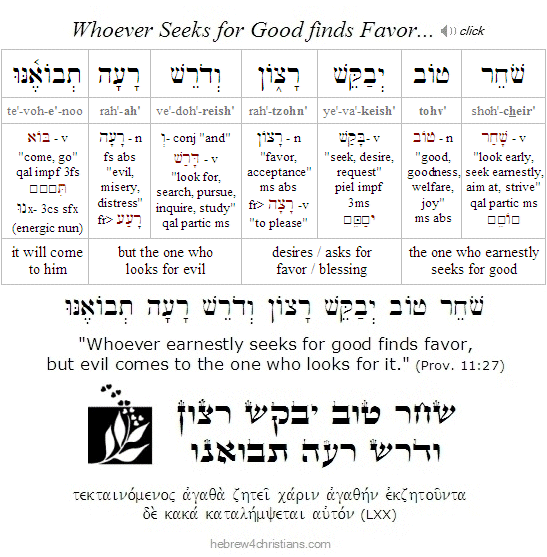
Hebrew Study Card
Shabbat Shalom dear friends, and may it please God to help us seek favor and good in all our circumstances... "Finally, brothers and sisters, whatever is true, whatever is worthy of respect, whatever is just, whatever is pure, whatever is lovely, whatever is commendable, if something is excellent or praiseworthy, think about these things" (Phil. 4:8).
Healing a Divided Heart...

03.07.19 (I Adar 30, 5779) The walk of faith involves kavanah (כַּוָנָה), or focus; we are to "press on" (διώκω) to hear the upward call of God (Phil. 3:14). The problem for many of us is that we are irresolute, indecisive, and therefore we hesitate... A divided heart is at war within itself, "two-souled" (δίψυχος) and unstable in all its ways (James 1:8). This is not a matter of intellect as much as it is of the affections of the heart, or the will... If "purity of heart is to will one thing," then impurity of heart is the result of simultaneously willing two things... It is therefore a state of inner contradiction, of having two separate "minds" or "wills" that hold contrary thoughts or desires. Yeshua said that "a divided house cannot stand." May it please God to heal us of such ambivalence by making our hearts whole, resolute, steadfast, full of conviction, and entirely awake to the glory of His Presence at our right hand (Psalm 16:8). The LORD is always near; he is not far from each one of us. "Draw near to God (ἐγγίσατε τῷ Θεῷ) and he will draw near to you; purify your hearts, you double-minded" (James 4:8). As it is written: "The LORD is near to all who call on Him, to all who call on Him in truth" (Psalm 145:18). May we be set free from lesser fears that divide the heart and rob the soul of shalom shelemah, God's perfect peace...
הוֹרֵנִי יְהוָה דַּרְכֶּךָ אֲהַלֵּךְ בַּאֲמִתֶּךָ
יַחֵד לְבָבִי לְיִרְאָה שְׁמֶךָ
hoh·rei·nee · Adonai · dar·ke·kha · a·ha·leikh · ba·a·mee·te·kha
ya·cheid · le·vah·vee · le·yeer·ah · she·me·kha

"Teach me your way, O LORD, and I will walk in your truth;
unify my heart to revere your Name."
(Psalm 86:11)

"To one who has faith in God, not explanation is necessary; to one who has no faith, no explanation is possible" (Thomas Aquinas). The heart looks through the eye, and therefore how we see is ultimately a spiritual decision: "If your eye is "single" (i.e., ἁπλοῦς, sincere, focused)," Yeshua said, "your whole body will be filled with light" (Matt. 6:22). The source of our problem, then, is the will, which serves as a gatekeeper of what we admit to ourselves, and the healing comes when we are honest before God and ask Him to be delivered from our ambivalence: "Teach me your way, O LORD, and I will walk in your truth; unite my heart to fear your Name" (Psalm 86:11).
Call to Draw Near...
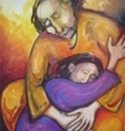
03.07.19 (I Adar 30, 5779) "Draw near to God, and he will draw near to you" (James 4:8). There are no conditions given here, other than your raw need to connect with God for help. "Purify your hearts, you double-minded ones" (δίψυχοι, lit. "two-souled ones"); make up your mind and be unified within your heart: "How long will you go limping between two different opinions?" (1 Kings 18:21). You are invited to come; God has made the way; your place at the table has been set and prepared. "Let us draw near with a sincere heart in full assurance of faith (ἐν πληροφορίᾳ πίστεως), with our hearts sprinkled clean from an evil conscience and our bodies washed with pure water. Let us hold fast the confession of our hope without wavering, for he who promised is faithful" (Heb. 10-22-23).
שׁוּבוּ אֵלַי נְאֻם יְהוָה צְבָאוֹת
וְאָשׁוּב אֲלֵיכֶם
shoo·voo · ei-lai · ne·oom · Adonai · tze·vah·oht
ve·ah·shoov · a·ley-khem

"Turn to me," says the LORD over all,
"and I will turn to you." (Zech. 1:3)

Note: The name Adonai Tzeva'ot (יהוה צְבָאוֹת) is usually translated as "the LORD of hosts" or "the LORD of armies," though the ancient Greek Torah (i.e., the LXX) translates it as κύριος παντοκράτωρ, meaning the "Lord (κύριος) over all other powers or forces, whether they are natural or spiritual (i.e., πᾶς, "all" + κράτος, "power"). This of course is implied in the Name YHVH (יהוה) itself, since God is the Source of all states of being whatsoever - past, present, and future (הוֶֹה והָיָה וְיָבוֹא). Yeshua is called the LORD Messiah our Savior, "the blessed and only Omnipotent One, the King of kings, and Lord of lords, who alone has immortality, who dwells in unapproachable light, whom no one has ever seen or can see. To him be honor and eternal dominion. Amen" (1 Tim. 6:15-16).
The Good Samaritan...

03.06.19 (I Adar 29, 5779) You probably recall Yeshua's parable of the "Good Samaritan" (i.e., Luke 10:25-37) as a moral lesson he gave about how we should love others, though it is important to realize that it is really about the love of God. To see this, recall that a "lawyer" (i.e., Torah scholar) once asked Yeshua, "What must I do to inherit eternal life?" and Yeshua then asked him to answer his own question: "What is written in the Torah? How do you understand it?" Now this is the great question of life, is it not? How do we get right with God, how do we attain eternal life? Yeshua here presses the man for his reasoning: "What do you think is the essential meaning and goal of divine revelation? What's the substance of your hope?" The lawyer answered Yeshua by citing the commandments to love God wholeheartedly and to love your neighbor as yourself (Deut. 6:5; Lev. 19:18), and while Yeshua readily agreed that the meaning of life is about love, he forcefully added, "Now do this, and you will live" (Luke 10:28). After the man reflected for a moment he wanted define the scope of his obligation -- was he to love his fellow Jew only or did the obligation extend further? In other words, who, exactly, is "my neighbor" - and by implication - who isn't? From whom may I withhold love and still "inherit" eternal life?
In response to the question, "Who is my neighbor?" Yeshua told the story of a traveler who was viciously attacked and left half dead alongside the road. First a priest and then a Levite came by, but both carefully avoided the man. Finally, a despised Samaritan came upon the traveler and spontaneously helped him. The surprising twist to this story is that the true neighbor was a "rejected outsider" who compassionately intervened to help the helpless, heal the wound, and save the dying. In this way Yeshua explained that it was a "strange grace" - an unexpected and even scandalous love from a "Stranger" - that signifies God's love. Apart from pointing out the contrast between those who knew the law and those who actually lived it, the deeper point of the parable was to reveal that we are often just like the priest and Levite of the story who disregard the needs of others, or worse, who justify their indifference based on their "religion." In this way Yeshua moves us to identify with the traveler who was stripped of clothing, beaten, and left half dead alongside the road. The moral of the story is that when we realize our own helplessness and need for God's unconditional love, we will encounter the heart of our True Neighbor, though he be "despised and rejected by men; a man of sorrows, and acquainted with grief; one from whom men hide their faces, unesteemed -- and yet one who bears our pains" (Isa. 53:3-4).
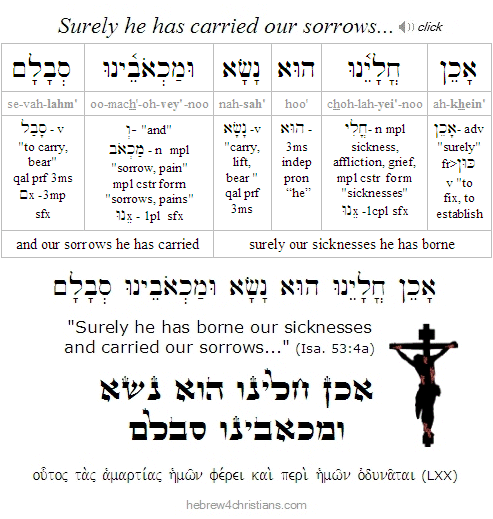 |
Advent of the Lamb...
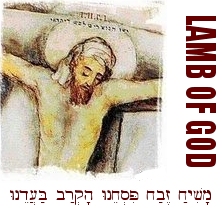
[ The following is related to this week's Torah reading, parashat Pekudei... ]
03.06.19 (I Adar 29, 5779) In our Torah portion this week (Pekudei) we learn that Moses consecrated the Mishkan (Tabernacle) on Rosh Chodashim, "the first day of the first month of the second year [since the Exodus]" (Exod. 40:17). Note that this date (i.e., Nisan 1) marks the start of the Biblical year and the month of the Passover redemption (see Exod. 12:1-12). The Torah's calendar therefore begins with the advent of the lamb of God, just as the central sacrifice of the Tabernacle was the daily sacrifice (i.e., korban tamid: קָרְבַּן תָּמִיד) of a lamb offered with unleavened bread and wine. The LORD calls this "My offering, My bread..." (see Num. 28:1-8). In other words, the service and ministry of the Tabernacle constantly foreshadowed the coming Lamb of God who would be offered upon the altar "made without hands" to secure our eternal redemption (Heb. 9:11-12).
Expelling the Darkness...

[ "For our struggle is against spiritual forces of evil..." Eph. 6:12 ]
03.05.19 (I Adar 28, 5779) Human life is a battleground of forces, and each person is engaged in a spiritual war for the healing of their soul... Often we are not willing to enter the battle until we have been sufficiently wounded by own own sins: many of us have to become "sick of being sick" until we are ready to seriously engage the underlying issues.
The battle is not optional. We must learn to deal with our own inner struggle against evil. Before we can help others to be free, however, we must be free ourselves, and that means learning how to expel the darkness hidden within our own hearts and to walk in God's light. Deliverance means being set free from that which "possesses" us, and that includes the demonic strongholds of fear, anger, envy, lust, and so on. Left unchallenged, such impulses can lead the soul to dark thoughts, self-alienation, shame -- a tenuous existence of subjugation and pain. The way of deliverance is to "name the demon," that is, to challenge the ground it claims and to exercise divine authority over our hearts. Above all this means being honest about our struggle and taking a decisive stand against our own oppression... Fighting the "good fight of faith" means caring enough to be healed...
We can only face the demonic if we are willing to be honest with ourselves, for without genuine honesty we cannot see our condition. "A little leaven leavens the whole lump" (Gal. 5:9). We must be willing to confess that there is much within us that remains unhealed, and that we are often unmindful of what really motivates our behavior. Even those things we might suppose as good - our "religion" or our self-control, for example - can possess us in ways that bring harm to ourselves and others....
When Yeshua expelled the demonic, the afflicted soul was given inner peace and put into their "right mind" (Mark 5:15). In other words, deliverance from madness is linked to God's healing influence in our lives: "For God has not given us a spirit of fear, but of power, and of love, and of a sound (safe) mind" (2 Tim. 1:7). Note that the word translated "safe" comes from the verb sodzo (σῴζω), meaning to be healed from inner division. A delivered person has "inner balance" and is not easily overthrown by his conscious (or unconscious) passions. Such a person is grounded in reality: he knows who he is, what he needs, and is realistic about what he can and can't do. His soul is not divided but rather unified, centered, and focused. He is consciously present and accepts life without resistance.
Yeshua gives us "authority" over the demonic to heal (Luke 9:1). The Greek word authority, eksousia (ἐξουσία), is a compound formed from the preposition ek- (ἐκ), meaning "out of," and the noun ousia (ουσία), meaning "being" or substance, thereby suggesting power over physical and spiritual reality. Another way to understand the word, however, is to see it as the ability to see beyond the realm of the transient abide within the realm of the Eternal. The Father represents the unseen, the infinite, the supreme providential and transcendental aspects of the One true God, just as the Son represents the seen, the finite, the suffering and immanent aspects of God... They are One (similarly the Holy Spirit is the Spirit of God, and therefore is One with God). Yeshua was entirely submitted to the will of the Father, which means he was able to let go and trust in the all-encompassing Divine Presence. His life was grounded in his relationship with the Eternal: "He that has seen me has seen the Father" (John 14:9). Since Yeshua lived in complete unity or "oneness" with God, he was completely centered and fully conscious of his identity as God's Son. His authority came from being preoperly aligned or related to God the Father, that is, ultimate reality, which enabled him to be a vessel or conduit for the expression of God in the world.
The Scriptures state: "Yield yourselves to God; take a stand against the devil and he will flee from you" (James 4:7). We first ground ourselves in what is real - surrendering and accepting the given moment - and then we decisively refuse to be taken captive by our imagination, fear, lust, etc. When we turn to the light the darkness will be expelled (John 1:5). Let's choose life and therefore live (Deut. 30:19); let's take our stand against the powers of hell; let's repudiate our fears and "spiritually slay" whatever seeks to drive and control us. May our hearts grow quiet before the Divine Presence and abide in peace...
Light in the Darkness...

03.05.19 (I Adar 28, 5779) From the point of view of the spirit, the outer is not the inner, since the kingdom of heaven is manifest within you (John 14:21; Luke 17:21). The realm of mere appearance is therefore inherently deceptive and misleading. Faith trusts in the unseen power of God, not by using eyes that look at the shadows of the world and its emptiness. As Yeshua said, "Do not judge by appearances (ὄψις), but judge with right judgment" (John 7:24). The world and its lusts passes away; it is entirely vain and empty: "tohu" (תּהוּ) - confusion and unreality (1 John 2:15-17). And if even an army were to rise up against us, the heart of faith shall not fear, since it discerns that all things that are ultimately real come to us from the Living God, from the One who speaks to the heart and calls us to believe in the unseen good. "The LORD is my light and my salvation; whom shall I fear?"
יְהוָה אוֹרִי וְיִשְׁעִי מִמִּי אִירָא
יְהוָה מָעוֹז־חַיַּי מִמִּי אֶפְחָד
Adonai · oh·ree · ve·yeesh·ee, · mee·mee · ee·ra?
Adonai · mah·ohz · chay·yai · mee·mee · ef·khad?

"The LORD is my light and my salvation; whom shall I fear?
The LORD is the stronghold of my life; of whom shall I be afraid?"
(Psalm 27:1)

Hebrew Study Card
Surely our great need is to have heart, to find strength, resolution, and steadfast determination to walk boldly during these heartless and depraved days (2 Tim. 3:1-5). We are not without God's help, of course. Yeshua told us that the Ruach HaKodesh (רוּחַ הַקּדֶשׁ) would be "called alongside" (παράκλητος) to comfort us during the journey. The English verb "comfort" literally means "to give strength" (from com- ["with"] and fortis ["strong"]), an idea similarly expressed by the verb "encourage," that is, to "put heart [i.e., 'core'] within the soul." In Hebrew, the word courage is expressed by the phrase ometz lev (אמֶץ לֵב), meaning "strong of heart," denoting an inner quality of the will rather than of the intellect. Ometz lev means having an inner resolve, a passion, and a direction.
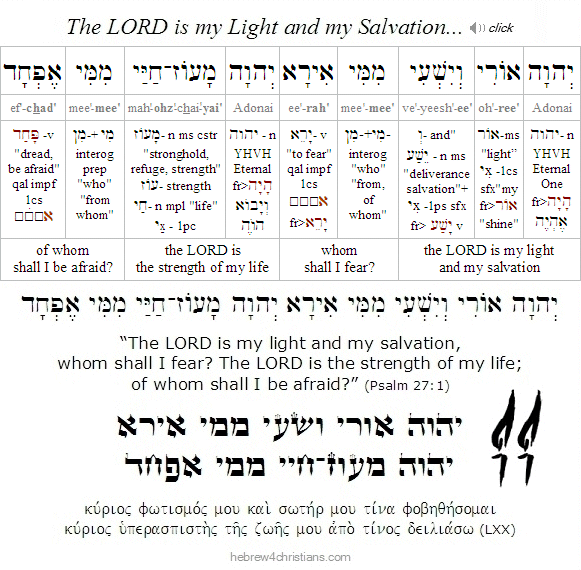 |
By faith Noah, being warned by God concerning events as yet unseen, in reverent fear constructed an ark for the saving of his household. By this he condemned the world and became an heir of the righteousness that comes by faith (Heb. 11:7). "Therefore we do not lose heart (lit., we do not faint in despair). Though our outer self is wasting away, our inner self is being renewed day by day. For this light momentary affliction is preparing for us an eternal weight of glory beyond all comparison, as we look not to the things that are seen but to the things that are unseen. For the things that are seen are transient, but the things that are unseen are eternal" (2 Cor. 4:16-18). Press on toward the goal for the prize of the upward call of God in Yeshua our Messiah (Phil. 3:14).
Beauty for ashes friends.... Menachem Mendl once wrote that there are three things fitting for us to do: upright kneeling, motionless dancing, and silent screaming... Not everyone will understand the pain that moves us to seek inner healing, but Gods' Presence shines for us all... May God fill you with His peace and comfort, even in the midst of the sometimes stormy struggle to surrender to His perfect love. Be strong and let us be strengthened as we trust in Yeshua, our great LORD and Messiah, the Master of the Storm, our Healer and our Deliverer. Amen.
Practice Seeing the Good...

[ The following is related to our Torah reading for this week, parashat Pekudei... ]
03.04.19 (I Adar 27, 5779) We are instructed to see small miracles, everyday "signs and wonders..." The sages say that a verse from our Torah portion this week suggests that we are obliged to recite at least 100 blessings a day: "... a hundred sockets for a hundred talents of silver, one talent per socket" (Exod. 38:27). The Gerer Rebbe comments, "Just as hundred sockets served as the foundation for the sanctuary, so the daily blessings represent the soul's foundation in holiness." In Jewish thinking, we "bless" God by offering our thanks, and thereby consciousness of life is sanctified. The Hebrew term for gratitude is hakarat tovah (הַכָּרַת טוֹבָה), a phrase that means "recognizing the good." The heart looks through the eye, and therefore how we choose to see is a spiritual decision: "If your eye is "single" (i.e., ἁπλοῦς, sincere, focused)," Yeshua said, "your whole body will be filled with hallel - light" (Matt. 6:22). When we see rightly, we will behold the radiance of God pervading our way, even in the midst of our mundane affairs (Isa. 6:3). A grateful heart is awake to God's Presence in the little things of life, those small miracles and glories that constantly surround us. And just as the manna would taste according to the gratitude of the person eating, so it is with the inner vision of truth: The good eye of faith sees hundreds of reasons to bless God for the precious gift of life. The LORD is "enthroned within the praises of His people."
אַתָּה קָדוֹשׁ
יוֹשֵׁב תְּהִלּוֹת יִשְׂרָאֵל
ve·a·tah · kah·dohsh
yoh·sheiv · te·hee·loht · yees·rah·eil

"You are holy,
the One enthroned within the praises of Israel."
(Psalm 22:3)

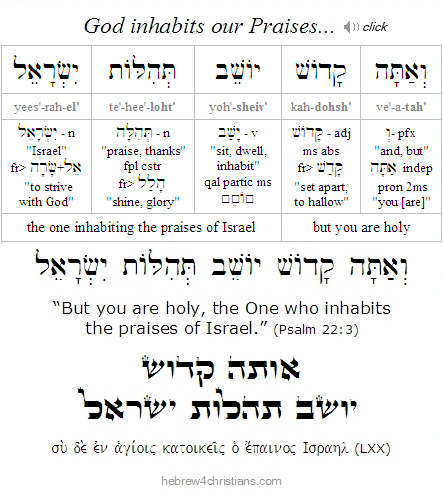 |
The thank offering mentioned in the Torah (i.e., zevach ha-todah: זֶבַח הַתּוֹדָד) reappears in the New Testament. In the Book of Hebrews were are instructed to "continually offer up a sacrifice of thanks (זֶבַח תּוֹדָה) to God, that is, the fruit of lips that acknowledge his Name" (Heb. 13:15). It is interesting to note that the Greek verb used to "offer up" (i.e., ἀναφέρω) is used to translate the Hebrew verb "to draw near" (karov) in Leviticus. In other words, the "offering up of thanks" for the sacrifice of Yeshua functions as "korban" and draws us near to God. Thanking God for personal deliverance constitutes "right sacrifices" (זִבְחֵי־צֶדֶק) as we draw near to God in the hope of His love (Psalm 4:5; Heb. 7:19).
"Give thanks to the LORD for He is good; his love endures forever" (Psalm 136:1); "give thanks to the LORD always" (Col. 3:17; Eph. 5:20; 1 Thess. 5:18)... Gratitude is foundational to our lives as followers of Yeshua. Indeed there are really only two prayers we ever offer to God, namely "Help, LORD!" and "Thank you, LORD." Meister Eckhart once remarked that if the only prayer you said in your entire life was, "thank you," that would suffice... Genuine prayer ultimately resolves to an expression of thanks. We are to "praise the Bridge that carries us over" into the Presence and Love of God, and that Bridge is Yeshua our Lord.
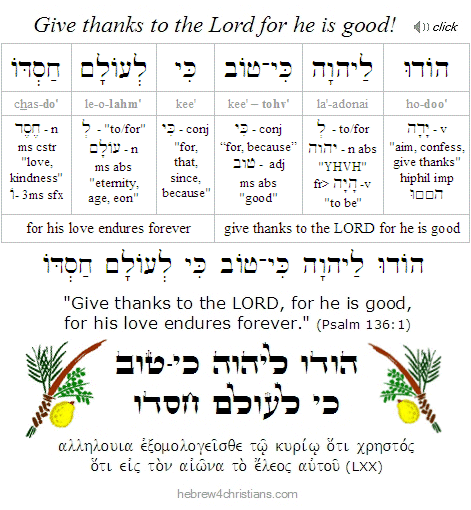 |
The message here is simple: If you want to see blessing you must open your eyes... The "commandment" here is more of a mitzvah, that is, an opportunity to connect with God's heart -- to become alive and awake! The idea is that you "get to" see the miracle, not that "you must" see it. It is always a choice to believe (Col. 3:15).
Glory Fills the Temple (פרשת פקודי)

03.03.19 (I Adar 26, 5779) Our Torah reading for this week is parashat Pekudei, which is the final portion of the Book of Exodus. It begins with Moses' accounting of (פקודי) all the materials that were donated for the construction of the Mishkan (i.e., Tabernacle). After Moses recorded the inventory of the building materials and furnishings, he carefully checked the special priestly garments. After all the work was confirmed to be in complete accordance with the LORD's instructions, Moses blessed the people. The LORD then commanded Moses to assemble the Mishkan on "the first month in the second year [from the date of the Exodus], on the first day of the month" (i.e., on Nisan 1, or Rosh Chodashim, Exod. 40:17).
Once the Tabernacle was completed and all its vessels were accounted for and inspected, Moses anointed all its components with the sacred anointing oil, called shemen ha-mishchah (note that the word "mishchah" (מִשְׁחָה) comes from the same root as "Messiah" (מָשִׁיחַ), indicating that the Mishkan (i.e., Tabernacle) would foreshadow God's plan of redemption given in Yeshua). Moses then formally initiated Aaron and his four sons into the priesthood, marking their hands and feet with sacrificial blood and "waving them" before the Lord to picture resurrection. God's Presence - manifest as the Shekhinah Cloud of Glory – then filled the Holy of Holies in the Tent of Meeting.
At the end of the portion we read, וַיְכַל משֶׁה אֶת־הַמְּלָאכָה / "Moses finished all the work" (Exod. 40:33), a phrase that has the same gematria (numeric value) as bereshit (בְּרֵאשִׁית, "in the beginning"), the very first word of the Torah (Gen. 1:1). This suggests that the creation of the universe was for the sake of the building of the Tabernacle, and by extension, for the sake of the sacrificial love of God to be demonstrated to all of creation. The Talmud states, "All the world was created for the Messiah" (Sanhedrin 98b) and indeed, Yeshua is called "the Lamb slain from the foundation of the world" in the New Testament (Rev. 13:8; 1 Pet. 1:18-20; Eph. 1:4; 2 Tim. 1:9).
The Presence of the Glory of God that descended from Sinai upon the newly dedicated Mishkan represented a climactic moment for the fledgling nation, since the Sin of the Golden Calf had jeopardized whether the God would indeed dwell within the midst of the camp of Israel... Recall that it was only after Moses had returned from Sinai bearing the second set of Tablets (on Yom Kippur) that the glow of the LORD's redeeming love radiated from his face, and new hope was given to Israel (prefiguring the New Covenant). The King of Glory would accompany the people from Sinai to the Promised Land! (The narrative continues in the Book of Numbers, beginning exactly one month after the Mishkan was assembled.)
Seeing your new Face....
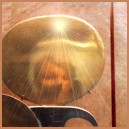
[ The following is related to this week's Torah reading, parashat Vayakhel... ]
03.01.19 (I Adar 24, 5779) At the entrance of the Mishkan (i.e., "Tabernacle") a copper "laver" was built, the place where we wash and prepare ourselves to come before the Divine Presence (Exod. 30:18). The Torah says the basin was made from the mirrors of women who willingly sacrificed them to help build the sanctuary (see Exod. 38:8). Spiritually understood, the mirror was transformed from a place where we encounter our own appearance to a place where we encounter God. Instead of focusing on our superficial face – how it looks and how we esteem ourselves, we now see ourselves in light of God's love, with our former self-image "sacrificed" or surrendered for the gift of a deeper self (2 Cor. 5:16). This is the "new self" cleansed by the Word of God, reflecting back the radiance of His Presence, as it says: "put on the new self (האדם החדשׁ) created after the likeness of God in true righteousness and holiness" (Eph. 4:24).
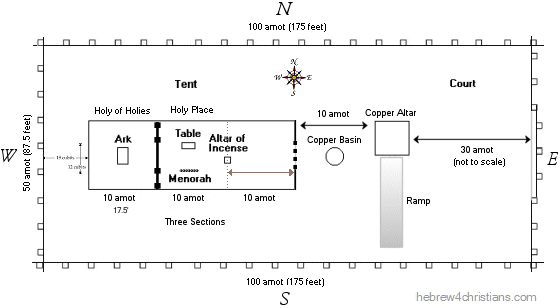 |
The sacrificed mirror represents turning to face reality, to see ourselves as God see us... Because of Yeshua, we have access to the inner heart of God (Heb. 4:16). Know who you are in Messiah: "And we all, with unveiled face, beholding the glory of the Lord, are being transformed into the same image from one degree of glory to another. For this comes from the Lord who is the Spirit" (2 Cor. 3:18). Shabbat shalom, friends!
Love Believes all things...

03.01.19 (I Adar 24, 5779) "I would have fainted unless I believed to see the goodness of the LORD..." (Psalm 27:13). Faith is therefore self-authenticating: as you trust in the good, the good will be revealed: believe to see! As Yeshua said, "According to your faith be it done unto you" (Matt. 9:29). And if it is faith that makes you whole, then its lack makes you sick... As you doubt, so you will lose sight of what is real, true, and abiding. Being cynical is cowardly: "There are two ways to be fooled. One is to believe what isn't true; the other is to refuse to believe what is true" (Kierkegaard). The cynic refuses the possibility of truth because he is afraid of being fooled, and for this fear he willingly closes his eyes to the good. "Believe that life is worth living, and your belief will help create the fact" (James). When we trust God's promises, we affirm an unseen good even if the present hour is shrouded in darkness. Faith sees beyond "the seen" to the unseen (2 Cor. 4:18). The "seen" is not ultimately real, and consequently faith is exiled from the vanity of the present hour (עולם השקר ). Therefore affirm your faith, dear friend; do not allow your heart to waver. Refuse the darkness of fear by choosing to believe in the reality of God's love for your soul, despite the mess you've made of your life. Affirm that God's love is more real, more substantive, and more valuable than anything disclosed in this world that fades away. Amen.
Receiving Salvation...

[ How do we get "saved" or are made right with God? Is it by means of religious rituals, or by doing good deeds, or by believing certain things about God, or perhaps all of these? ]
03.01.19 (I Adar 24, 5779) I recently read from a Christian devotional book that said that in order to receive God's salvation you must: 1) believe in Jesus' substitutionary death and resurrection; 2) turn away from your sins, and 3) ask him to be the Lord and Savior of your life. The author then went on to explain that "this means you have to renounce and turn away from everything in your life that is contrary to what God wants: you must give up your sinful self-centeredness and turn to God." Now while at first glance this approach sounds Biblical, it implicitly assumes that your own goodness and self-effort will save you. After all, if you could turn away from your sins and from "everything in your life that is contrary to what God wants," and if you could simply "give up your sinful self-centeredness," then there really would be no need for the miracle of spiritual rebirth, no need for the power of God to impart a new nature to you, and therefore no need for the cross of Messiah to save you from the verdict of the moral law. Contrary to the false gospel that God helps those who help themselves, we must emphasize that God helps precisely those who cannot help themselves... Indeed the teaching of the New Covenant is clear: God will perform a miracle by putting his Torah within your will, writing it on your heart, and making you into his child (Jer. 31:33; Ezek. 36:26; John 3:3; 2 Pet. 1:4). All this comes from the power of God alone, however, not by human aspiration or resolution or good works (John 1:12-13; 6:44; Rom. 10:9-12; Titus 3:5). Like father Abraham, we are "made right" with God by believing in his power, relying on his Spirit, and trusting in his promise of love (Hab. 2:4; Rom. 4:13-25). Yeshua did not come to make a new religion but to give life to the dead. Therefore it is no longer "I" who live but Messiah in me, which is to say that we do not possess the miracle but the miracle possesses us... You are made into a new creation (בְּרִיָּה חֲדָשָׁה); your former life is passed and now all things become new (2 Cor. 5:17). But again you are not saved by reforming your character or making oaths of faith, but trusting in God's power and character. This is the way to receive the blessing. You come to God just as you are - acknowledging the truth of your need for healing and deliverance from your sinful condition, pressing past the verdict of the law in your desire for God's compassion (Psalm 85:10; Rom. 4:25). That's the heart of the gospel, after all. All you can do is bring is your brokenness and need to God for healing and then to respond to God's love by receiving it with humility and gratitude. Being made right with God is the gift of accepting that you are accepted despite your unacceptability because of God's great mercy for your life.
It's almost comical to think that we must pledge to be perfect before we can come to the Lord for salvation. Can you imagine a person who has suffered for years as an alcoholic or addict of some kind being told that in order to be made right with God, they must believe that Yeshua died for their sins and that they therefore must turn away from all their sins, be perfect in their resolve, and pledge never to sin or be selfish again? For those of you who have suffered from addiction or struggled with chronic character defects in your lives, you know that empty promises to change mean nothing when it comes to turning away from what holds you in bondage... עָקב הַלֵּב מִכּל וְאָנֻשׁ ה֑וּא מִי יֵדָעֶנּו - "The heart is deceitful above all things and incurably sick: Who can know it?" (Jer. 17:9).
None of this is meant to impugn the importance of living your faith and making godly choices, of course... "Faith without works is dead," but note that such "works" come from the Spirit of God, as the truth that is worked into us is worked out in our experiences. The "work" of God is to believe in Yeshua (John 6:29) and true faith will "show up" in our lives... We must test the spirits but more importantly test our own -- do you really believe, even when you are tempted to judge yourself or others? There's nothing "easy" about really believing in God (though it is easy enough to say you believe when in fact you don't). The pattern remains: unless a seed "falls to the ground" and dies it abides alone; but if it dies, it brings forth much fruit (John 12:24). We first encounter the risen Lord and connect with the truth, and then we get off our crazy road to Damascus... Our subsequent life of sanctification is a "slow motion" catching up with the miracle and reality of the new birth wherein we "become who we are" in the Messiah (Col. 1:27; 3:1-4). In this connection, however, please remember that all the commandments of the New Covenant are directed to the new nature, not the old "Adamic" nature that is mortified and buried away from the life of the child of God.
"This wish to satisfy someone greater than the self, to be found acceptable, to belong at last, is a struggle familiar to many psychotherapy patients. In their lives they waste themselves on wondering how they are doing, on trying to figure out the expectations of others so that they can become someone in the eyes of others. They try to be practical, to be reasonable, to figure it all out in their heads. It is as though if only they could get the words straight in their heads, if only they could find the correct formula, then everything else in their lives would be magically straightened out. They are sure there is a right way to do things, though they have not yet found it. Someone in authority must know... It is as though it were discovered that two and two really did not equal four (but five), then at that moment all over the world every machine would stop operating, all of the lights would go out." (Sheldon B. Kopp)
Note: The Gospel and Buddhism...
Reflecting on the meaning of the true gospel message reveals that Buddhism (and Hinduism from which it evolved) presents another "gospel of humanism" as well. For instance, for many Buddhists life is suffering (dukkha) caused by selfish desire (tanha), and the way of salvation (moksha) from the wheel of rebirth (samsara) is to attain "nirvana," that is, to extinguish the ego and its desires by means of the enlightened practice of "right" views, intentions, speech, action, livelihood, effort, mindfulness, and concentration summarized as the "Noble Eightfold Path." The eightfold path, in other words, is the means by which the soul is ultimately transformed and healed... On the other hand ancient Hinduism teaches that salvation is attained when we attain "divine consciousness" through various forms of "yoga" or ascetic disciplines. Only after long study and religious practices do we learn that all things are "one," and therefore the depth of the soul ("Atman") is ultimately divinity ("Brahman"). Salvation means becoming aware that you are inherently embedded into the oneness of all that is real: "One is the word of truth; two is the word of error." Duality of any kind is an illusion (maya), but understanding that "atman is Brahman" leads to timeless understanding and infinite bliss (mukti). The humanistic practice of various forms of yoga are the means by which people are saved -- not the revelation of the Mystery and Love of the Living God who radically intervenes in this world to save humanity from spiritual death.
Seeing the Invisible...

03.01.19 (I Adar 24, 5779) Faith sees the invisible light, the truth of love that overcomes all the powers of darkness, hate, and fear. "I believe. I believe in the sun even when it is not shining; I believe in love even when feeling it not; and I believe in God, even when God is silent" (from an anonymous poem found on the wall of a cellar in Cologne, Germany, where some Jews hid from the Nazis).
The soul testifies that there is "unfinished business," that there is more than meets the eye, that evil will not have the last word, and that tears will one day forever be wiped away. Despite the ambiguity, faith "hopes against hope" that the LORD God will intervene and bring everlasting healing to us all. As it says, "Let him who walks in darkness and has no light trust in the Name of the LORD (יִבְטַח בְּשֵׁם יְהוָה) and rely on his God."
מִי בָכֶם יְרֵא יְהוָה שׁמֵעַ בְּקוֹל עַבְדּוֹ
אֲשֶׁר הָלַךְ חֲשֵׁכִים וְאֵין נגַהּ לוֹ
יִבְטַח בְּשֵׁם יְהוָה וְיִשָּׁעֵן בֵּאלהָיו
mee vah·khem ye·rei Adonai shoh·may·a be·kohl av·doh
a·sher hah·lakh cha·shei·kheem ve·ein noh·gah loh
yeev·tach be·shem Adonai ve·yee·shah·ein be·loh·hahv

"Who among you fears the LORD and obeys the voice of his servant?
Let him who walks in darkness and has no light
trust in the Name of the LORD and rely on his God."
(Isa. 50:10)

Hebrew Study Card
Faith is a sort of "holy protest" over the state of the world: "How long, O LORD, forever?" Eventually God will wipe away every tear and make all things right... Bittachon (trust) is a word for this world, which says, "Though he slay me, I will trust in him..." Those who call upon the LORD can trust not only in concealed good behind ambiguous appearances ("all things work together for good") but also in a future, real, substantive good that will one day be clearly manifest for us all. Meanwhile, may God keep us from such depth of sorrow that leads to sickness, darkness and despair. Amen.
|


